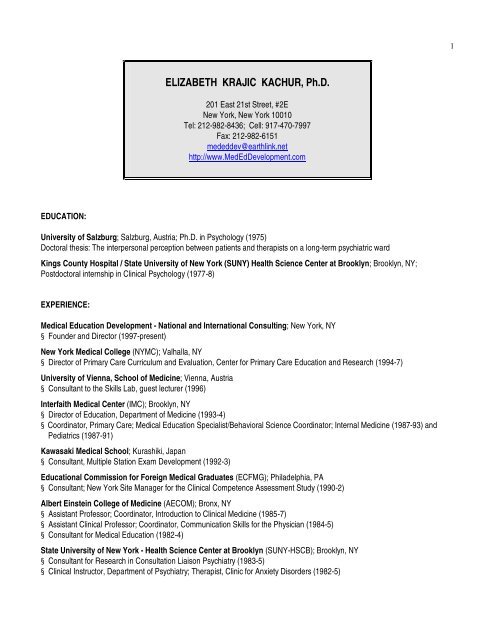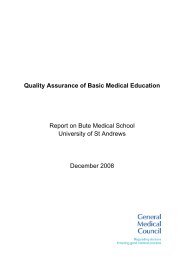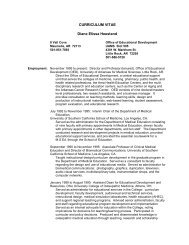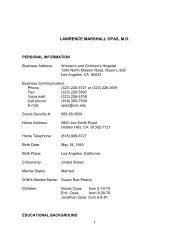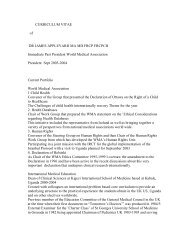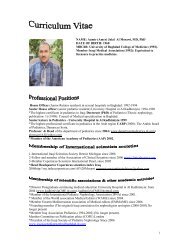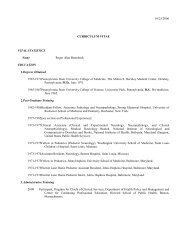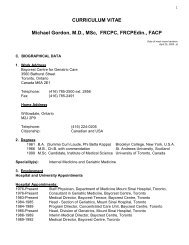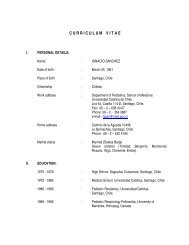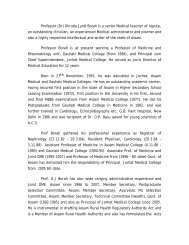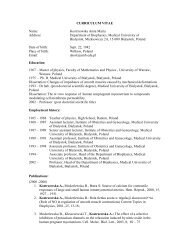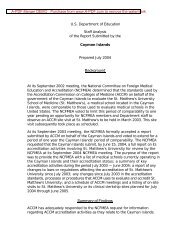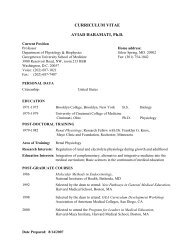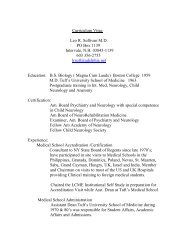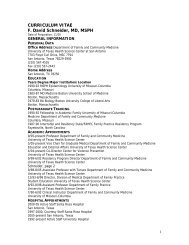ELIZABETH KRAJIC KACHUR, Ph.D. - IAOMC
ELIZABETH KRAJIC KACHUR, Ph.D. - IAOMC
ELIZABETH KRAJIC KACHUR, Ph.D. - IAOMC
You also want an ePaper? Increase the reach of your titles
YUMPU automatically turns print PDFs into web optimized ePapers that Google loves.
1<br />
<strong>ELIZABETH</strong> <strong>KRAJIC</strong> <strong>KACHUR</strong>, <strong>Ph</strong>.D.<br />
201 East 21st Street, #2E<br />
New York, New York 10010<br />
Tel: 212-982-8436; Cell: 917-470-7997<br />
Fax: 212-982-6151<br />
mededdev@earthlink.net<br />
http://www.MedEdDevelopment.com<br />
EDUCATION:<br />
University of Salzburg; Salzburg, Austria; <strong>Ph</strong>.D. in Psychology (1975)<br />
Doctoral thesis: The interpersonal perception between patients and therapists on a long-term psychiatric ward<br />
Kings County Hospital / State University of New York (SUNY) Health Science Center at Brooklyn; Brooklyn, NY;<br />
Postdoctoral internship in Clinical Psychology (1977-8)<br />
EXPERIENCE:<br />
Medical Education Development - National and International Consulting; New York, NY<br />
• Founder and Director (1997-present)<br />
New York Medical College (NYMC); Valhalla, NY<br />
• Director of Primary Care Curriculum and Evaluation, Center for Primary Care Education and Research (1994-7)<br />
University of Vienna, School of Medicine; Vienna, Austria<br />
• Consultant to the Skills Lab, guest lecturer (1996)<br />
Interfaith Medical Center (IMC); Brooklyn, NY<br />
• Director of Education, Department of Medicine (1993-4)<br />
• Coordinator, Primary Care; Medical Education Specialist/Behavioral Science Coordinator; Internal Medicine (1987-93) and<br />
Pediatrics (1987-91)<br />
Kawasaki Medical School; Kurashiki, Japan<br />
• Consultant, Multiple Station Exam Development (1992-3)<br />
Educational Commission for Foreign Medical Graduates (ECFMG); <strong>Ph</strong>iladelphia, PA<br />
• Consultant; New York Site Manager for the Clinical Competence Assessment Study (1990-2)<br />
Albert Einstein College of Medicine (AECOM); Bronx, NY<br />
• Assistant Professor; Coordinator, Introduction to Clinical Medicine (1985-7)<br />
• Assistant Clinical Professor; Coordinator, Communication Skills for the <strong>Ph</strong>ysician (1984-5)<br />
• Consultant for Medical Education (1982-4)<br />
State University of New York - Health Science Center at Brooklyn (SUNY-HSCB); Brooklyn, NY<br />
• Consultant for Research in Consultation Liaison Psychiatry (1983-5)<br />
• Clinical Instructor, Department of Psychiatry; Therapist, Clinic for Anxiety Disorders (1982-5)
2<br />
PROFESSIONAL ACTIVITIES:<br />
Journals/Newsletters<br />
• Reviewer for Journal of General Internal Medicine (2006)<br />
• Reviewer for Journal of the American Medical Association (2005)<br />
• Reviewer for Medical Teacher (2001 - present)<br />
• Reviewer for Medical Education (1999 - present)<br />
• Member, Editorial Advisory Committee for Medical Education Online (1996-present)<br />
• Reviewer for Teaching and Learning in Medicine (1995, 2006)<br />
• Guest editor for the special Medical Encounter issue: The patient-physician relationship in Japan and other Asian<br />
countries (1994)<br />
• Liaison Column editor for Medical Encounter - Newsletter of the American Academy on <strong>Ph</strong>ysician and Patient (1988-98)<br />
Conferences<br />
• Associate Chair for Special Projects, 12 th Ottawa Conference on Clinical Competence, New York, NY (2006)<br />
• Scientific Committee Member, International Health Communication Conference, Chicago, (2005, 2007)<br />
• Research Committee Chair, American Academy of <strong>Ph</strong>ysician and Patient, Annual Academy Forum (2003, 2006)<br />
• Co-organizer, Managed Care Education Evaluation Workshop, University of Michigan (2001)<br />
• Abstract Reviewer for the AAMC Annual Meeting (Group on Educational Affairs and Research in Medical Education)<br />
(2001 to present)<br />
• Abstract Reviewer for the American Educational Research Association Annual Meeting (2000-4)<br />
• Organizing Committee Member, AAMC: Northeast Group on Educational Affairs Annual Meeting, St. Johns, NF, Canada<br />
(1999)<br />
• Abstract Reviewer for the Generalists in Medical Education (1996 to 2005)<br />
• Invited Participant, Cleveland Clinic Foundation Symposium: Educating <strong>Ph</strong>ysicians for the Future: Managed Care Issues<br />
in Graduate Medical Education (1996)<br />
• Co-Organizer for the Annual Forum of the American Academy on <strong>Ph</strong>ysician and Patient (1995-8)<br />
• Co-Organizer for a meeting of the Medical Education Specialists’ Network - Northeast Region (1989)<br />
• Organizer, moderator and/or discussant for panels at various events (see presentation listings for details)<br />
Organizations<br />
• Innovations Award Committee Member, AAMC - North East Group on Educational Affairs (2006)<br />
• Co-Chair, Exemplar Group on train-the-training programs in preparedness training, American Public Health Association<br />
(2005)<br />
• Chair, Topic Review Group, Best Evidence Medical Education (BEME) – Review of Communication Skills Assessment Tools<br />
(ROCAT) (2001-present)<br />
• Senior Advisory Committee Member, New York Academy of Medicine, Development of an Assessment Tool to Evaluate<br />
Medical School Curricula on cultural Competence (2004)<br />
• Advisory Group Member, National Hispanic Medical Association, Cultural Competency Assessment Project (2002)<br />
• Elected Member-at-Large for the Generalists in Medical Education (1997-2000)<br />
• Advisory Group Member, Managed Care Curriculum Retreat of The Tufts Managed Care Institute (1999)<br />
• Advisory Group Member, Enhancing Geriatric Knowledge of Practicing <strong>Ph</strong>ysicians Through CME of The American Geriatrics<br />
Society (1997)<br />
New York Medical Education Journal Club (On-line and in-person discussion group)<br />
• Founder and moderator (1995-99)<br />
Medical Education at the Turn of the Millennium - Objects and Images that Define our Culture (Interactive exhibit)<br />
• Convener of international committee (1999)<br />
• Data collection (1999-00)
3<br />
• Culture exhibition installations (2000-2):<br />
Ottawa in Africa Conference; Cape Town, South Africa<br />
North Eastern Group of Medical Education; Hanover, NH<br />
Association for Medical Education in Europe (AMEE) Annual Meetings; Berlin, Germany & Lisbon, Portugal<br />
King’s College; London, UK<br />
• Workshops (2001-2):<br />
Qualitaet der Lehre; Vienna, Austria<br />
Association for Medical Education in Europe (AMEE) Annual Meetings; Berlin, Germany & Lisbon, Portugal<br />
• Exhibition reports (2000-2):<br />
Congress 2000: A CME Summit on the Practices, Opportunities and Priorities for the New Millennium; Universal City, CA<br />
Association for Medical Education in Europe (AMEE) Annual Meeting; Beer Sheva, Israel<br />
New York University: 13 th Annual Culture Exhibition; New York, NY<br />
International Association for Medical Science Educators (IAMSE) Annual Meeting; Guadalajara, Mexico<br />
Ottawa Conference for Clinical Competence; Ottawa, Canada<br />
PROFESSIONAL SOCIETY MEMBERSHIPS:<br />
• Global Alliance for Medical Education - GAME (2005 to present)<br />
• Association of Standardized Patient Educators – ASPE (2002 to present)<br />
• Association for the Study of Medical Education – ASME (2001 to present)<br />
• European Association for Communication in Healthcare – EACH (2001 to present)<br />
• International Association for Medical Science Educators - IAMSE (2000 to present)<br />
• Association for Medical Education in Europe – AMEE (1997 to present)<br />
• Alliance for Continuing Medical Education – ACME (1997 to present)<br />
• Association of American Medical Colleges: Group on Educational Affairs – AAMC-GEA (1988 to present)<br />
• Society for General Internal Medicine - SGIM, formerly SREPCIM (1987 to present)<br />
• American Educational Research Association - AERA (1987 - 2004)<br />
• Generalists in Medical Education (1986 to present)<br />
• American Academy on Communication in Healthcare – AACH; formerly American Academy on <strong>Ph</strong>ysician and Patient – AAPP<br />
and SGIM Taskforce on Doctor and Patient (1985 to present)<br />
AWARDS:<br />
• Award for Innovation in Continuing Professional Development acknowledging: Lipkin M, Anderson M, Feldman H, Gillespie C,<br />
Kachur E, Kalet A, Triola M, Zabar S, Ravndal D. Psychosocial aspects of bioterrorism and Disaster Medicine: Education for<br />
readiness and response. A train-the-trainer program. Alliance for Continuing Medical Education (2006)<br />
• Best Poster Award acknowledging: Green S, Kachur E. Transforming breast cancer patients and survivors into communication<br />
skills teachers. International Conference on Communication in Health Care (2005)<br />
• Best Poster Award acknowledging: Kachur E, Altshuler L, Barrett S, Langenau E, Frank J, Schein A, Aeder L, Sylvia L, Mezey<br />
A. Educationally sound Genetics training in a Pediatrics residency. AAMC/Northeast Group on Educational Affairs<br />
Meeting (2004)<br />
• Recognition Award by Maimonides Medical Center, Department of Pediatrics (2000 and 2003)<br />
• Article Award acknowledging: Ban N, Tsuda T, Tasaka Y, Sasaki H, Kassai R, Wakunami M, Azuma S, Aoi K, Ochi N,<br />
Yamamoto Y, Ito K, Kachur EK. Introducing the Objective Structured Clinical Examination to evaluate students’ interviewing<br />
and physical examination skills. Medical Education (Japan) 25(6):327-335, 1994. Japan Society for Medical Education<br />
(1995)<br />
• Selection as Fellow to the American Academy on <strong>Ph</strong>ysician and Patient (1995)<br />
• Recognition Award by Interfaith Medical Center, Department of Medicine House Staff (1990)
4<br />
MULTIPLE STATION EXAMS AND TEACHING EXERCISES (principal collaborator/consultant):<br />
• Interdisciplinary Geriatrics OSCE (4 stations, 4 runs, 16 Internal Medicine residents and Psychology graduate students) –<br />
AECOM/Jacobi Hospital<br />
• Substance Abuse OSCE (5 stations, 131 Internal Medicine and Family Practice residents) – AECOM/Montefiore Medical<br />
Center<br />
• Genetics OSCE (5 stations, 16 runs, 66 Pediatrics residents) – Maimonides Medical Center<br />
• General Internal Medicine Fellowship OSTE (7 stations, 3 runs, 21 fellows and chief residents) – NYU<br />
• Lawyering Communication Skills Exercise (3 Stations, 9 runs, 16 law school faculty) – NYU<br />
• General Internal Medicine OSCE (9-12 stations, 21 runs, 2 sites, 252 residents) - NYU<br />
• Communication Skills OSCE (5-6 stations, 25 runs, 110 participants) - Maimonides Medical Center<br />
• Women’s Health OSCE (6-8 stations, 11 runs, 41 residents, gynecologists, internists and mid-level providers) - Gouverneur<br />
Diagnostic and Treatment Center/NYU<br />
• Interview Teaching OSTE (3 stations, 2 runs, 21 faculty) - CUNY Sophie Davis Medical School/NYU<br />
• Culture OSCE (5-6 stations, 40 runs, 170 Pediatrics residents) - Maimonides Medical Center<br />
• Macy Initiative in Health Communication OSCE (10 stations, 85 runs across 3 medical schools, 331 medical students) -<br />
NYU, UMASS, CWRU<br />
• Introduction to Primary Care Practice / Patient Centered Medical Interviewing GOSCE (5-10 stations, 16 runs, 360<br />
students) - CUNY Sophie Davis Medical School<br />
• Primary Care Skills Enhancement Pilot OSCE (10 stations, 2 runs, 14 practicing physicians) - NYU<br />
• Clinical Competence Assessment Project (9 stations, 38 runs, 265 residents) for the ECFMG at SUNY-HSCB<br />
• Body Fluid Exposure Counseling Exercise (6 stations, 7 residents) - IMC<br />
• Smoking Cessation Counseling OSCE (6 stations, 10 runs, 54 residents) - IMC<br />
• Orientation OSCE (20 stations, 16 runs, 127 residents) - IMC<br />
• <strong>Ph</strong>ysical Diagnosis and Interviewing Course OSCE (10 stations, 2 runs, 17 medical students) - IMC/SUNY-HSCB<br />
• Primary Care OSCE (12 stations, 3 runs, 2 sites, 29 Internal Medicine and Pediatrics residents) - IMC<br />
• <strong>Ph</strong>ysical Diagnosis Course GOSCE (10 stations, 7 runs, 4 sites, 176 medical students) - AECOM<br />
• <strong>Ph</strong>ysical Diagnosis Course Pilot OSCE (25 stations, 1 run, 25 medical students) – AECOM (First OSCE in the New<br />
York Metropolitan area - 1986)<br />
FACULTY DEVELOPMENT PROGRAMS (principal collaborator/consultant):<br />
• Assessment of Residents – Maimonides Medical Center<br />
• Interview Teaching and Introduction to Primary Care Practice - CUNY Sophie Davis Medical School<br />
• Performance-Based Assessment - NYU<br />
• Curriculum Development - CUNY Sophie Davis Medical School<br />
• School-wide Curriculum Retreat - CUNY Sophie Davis Medical School<br />
• How to Write Useful Goals and Objectives – CUNY Sophie Davis Medical School<br />
• Teaching about Managed Care - Maimonides Medical Center<br />
• Enhancing Patient-<strong>Ph</strong>ysician Communication - NYMC<br />
• Teaching Nutrition to Residents and Medical Students - NYMC<br />
• Surfing the Internet for Medical Education - NYMC<br />
• Conducting Basic Science Case Conferences - NYMC<br />
• Interview Teaching - NYMC, Metropolitan Hospital Center<br />
• Culture and Medical Education Round Table Symposium – NYMC / Metropolitan Hospital Center<br />
• Small Group Teaching - NYMC<br />
• Precepting at Community Practice Sites - NYMC<br />
• Microskills Teaching in the Ambulatory Care Setting - NYMC<br />
• Small Group Teaching - AECOM<br />
• Preventing Professional Burnout - AECOM
5<br />
CURRICULA, SYLLABI, INSTRUCTIONAL MODULES (principal collaborator/consultant):<br />
• Care of the School-aged Child / School-based Healthcare (programs for medical students, Pediatrics and Internal<br />
Medicine residents) - NYU<br />
• Patient-centered Teaching Team Project for Breast Cancer (interview training program for Family Practice, Internal<br />
Medicine and Surgery residents) – Overlook Hospital, NJ<br />
• Psychosocial Aspects of Bioterrorism (workshop for practicing physicians, train-the-trainer and online programs,<br />
http://chip.med.nyu.edu) - NYU/University of South Florida<br />
• Medical Director Decision Making (module for residents, http://www.mceconnection.com) – Maimonides Medical Center<br />
• Coding and Billing (module for residents, http://www.mceconnection.com) – Maimonides Medical Center<br />
• Women’s Health Cross Training Project (course for practicing gynecologists and internists) – Gouverneur Diagnostic and<br />
Treatment Center<br />
• Patient-Centered Interviewing (course for medical students) – CUNY – Sophie Davis Medical School<br />
• Managed Care (clinical/administrative rotation for Pediatrics residents) – Maimonides Medical Center<br />
• Introduction to Primary Care Practice (course for medical students) – CUNY Sophie Davis Medical School<br />
• Pediatric Residency Curriculum – Maimonides Medical Center<br />
• Osteopathic Pediatrics Residency Curriculum – Maimonides Medical Center<br />
• Nutrition in Medicine (five modules for residents) – NYMC<br />
• Managed Care (rotation for senior Primary Care residents, http://www.mceconnection.com, http://www.Med-Ed-Online.org)<br />
– NYMC<br />
• Introduction to Primary Care (course for first-year medical students) – NYMC<br />
• Behavioral Science (curriculum for Internal Medicine residents) – IMC<br />
• Interviewing and Communication Skills (curriculum for Internal Medicine residents) – IMC<br />
• <strong>Ph</strong>ysician Stress/Impairment (curriculum for Internal Medicine residents) - IMC<br />
• Preventive Medicine (curriculum for Internal Medicine residents) – IMC<br />
• Occupational and Environmental Medicine (curriculum for Internal Medicine residents) – IMC<br />
• Ambulatory Care Block Rotations (curriculum for Internal Medicine residents) – IMC<br />
• Primary Care Internal Medicine - Social Work Intern Collaborative Training (curriculum) – IMC<br />
• Primary Care (curriculum for Internal Medicine and Pediatric residents) – IMC<br />
• Introduction to Clinical Medicine (course for first- and second-year medical students) – AECOM<br />
• Human Behavior and Psychiatry for the <strong>Ph</strong>ysician (course for first-year medical students) – AECOM<br />
TEACHING ACTIVITIES (lectures, small group teaching, precepting):<br />
Communication Skills<br />
• Residents in Internal Medicine (1987-93) and Pediatrics (1987-91) - IMC<br />
• Second-year medical students from SUNY-HSCB (1988-9) - IMC<br />
• First-, second- and third-year medical students (1982-7) - AECOM<br />
Behavioral Sciences (e.g., human behavior, stress, adjustment to illness, cultural aspects of health care, sexuality),<br />
Introduction to Psychiatry, Death and Bereavement<br />
• Psychology externs and interns (1989-93) - IMC<br />
• Fourth-year medical students from SUNY-HSCB (1989-92) – IMC<br />
• Third-year medical students from New York College of Osteopathic Medicine (1988-91) – IMC<br />
• Residents in Internal Medicine (1987-93) and Pediatrics (1987-91) - IMC<br />
• Medical, dental, and nursing students (1985-93) - Columbia University<br />
• First- and third-year medical students (1982-7) - AECOM<br />
Primary Care (e.g., ambulatory health care delivery, prevention, team work, research)<br />
• First-year medical students (1994-7) - NYMC<br />
• Residents in Internal Medicine (1987-93) and Pediatrics (1987-91) - IMC
6<br />
PRESENTATIONS (workshops, panels, lectures, posters – see Professional Society Memberships for abbreviations):<br />
International:<br />
AMEE; Genoa, Italy; 2006<br />
• Child Standardized Patients - What feedback can they give to OSCE participants (Kachur E, Altshuler L, Langenau E,<br />
Aeder L, Schein A, Hilfer A, Sullivan D, Venkataraman A, Bultron G, Misra N, Farahan F, Schaeffer H, Shelov S)<br />
• Moderator for the session International medical education<br />
EACH; Basel, Switzerland; 2006<br />
• Confronting colleagues about unprofessional behavior: Communication challenges addressed in an OSCE (Kachur E,<br />
Altshuler L, Venkataraman A, Bultron B, Hilfer A, Aeder L, Schein A, Vargas I, Sessa V, Schaeffer H, Shelov S)<br />
• From breast cancer patient to communication skills teacher – How to effect a role change and instill instructional<br />
skills (Kachur E, Green S)<br />
AMEE; Amsterdam, Netherlands; 2005<br />
• So you want to be a mentor A workshop on mentoring skills (Ramani S, Kachur E, Gruppen L)<br />
• Convenor and chair for the symposium Exploring the future to shape Medical Education for the next two decades<br />
(Kachur E, Galbraith R, Gwee M, Harden R, Kovac K, Onur O, Reynolds R, Savage C, Westbye HJ, Yoshida I)<br />
• Performance-based instruments that measure medical communication competence – An update and expansion of<br />
previous reviews (Kachur E, Altshuler L and the Review of Communication Skills Assessment Tools (ROCAT/BEME) Group)<br />
EACH; Bruges, Belgium; 2004<br />
• Strategies for teaching clinicians about communicating with the media: What worked, what did not work (Kachur E,<br />
Praeger J, Freeman R, Lipkin M, Triola M, Yedidia M, Zabar S, Kalet A, Anderson M, Steigbigel N)<br />
• Organizing Communication Skills OSCEs across three sites and over three years – The Macy experience (Kachur E,<br />
Yedidia M, Gillespie C, and the Macy Initiative in Health Communication Initiative)<br />
AMEE; Edinburgh, UK; 2004<br />
• Objective Structured Teaching Exams (OSTEs) – Tools for teacher development and assessment (Kachur E, Morrison<br />
E, Schwartz M, Zabar S, Kalet A)<br />
• So you want to be a mentor: A staff development workshop on mentoring skills (Ramani S, Kachur E, Gruppen L)<br />
• Bedside teaching is fun, so why is clinical teaching occurring in corridors (Ramani S, Frank J, Hassell A, Kachur E)<br />
11 th Ottawa Conference on Medical Education: Preparing Health Professionals for the Future; Barcelona, Spain; 2004<br />
• Organizer and moderator of the session Multi professional education: Learning together to work together (invited)<br />
• Mentoring in Medicine: The challenges (Ramani S, Gruppen L, Kachur E)<br />
• Preparing to care for the school aged child in the community: School-based health clinics (Kalet A, Fierman D, Fisher<br />
M, Ferdman D, Kachur E, More F, Arbolino S, Tewksbury L, Hoover W, Anderson M)<br />
European Observatory on Health Systems and Policies; Workshop on Human Resources for Health Policy; Berlin, Germany;<br />
2004 (invited)<br />
• Health professions education in Europe: From national diversity to a common system (Kachur E, Krajic K)<br />
• Discussant for the presentation Improving incentives<br />
• Co-Chair for the session Professional education and training: Regulatory approach<br />
1 st Asia Pacific Medical Education Conference; Singapore; 2003<br />
• Disaster and terrorism preparedness training – A challenge all around (Kachur E, Coico R, Lipkin M, Terndrup<br />
T, Freeman R)<br />
• A review of Objective Structured Clinical Exams (OSCEs) for teaching and assessing communication skills (Kachur E,<br />
Mukohara K and the Review of Communication Skills Assessment Tools (ROCAT/BEME) Group)<br />
ASME; Edinburgh, UK; 2003 (invited)<br />
• The many uses of Objective Structured Teaching Exams (OSTEs) (Kachur E, Schwartz M, Zabar S, Kalet A)<br />
AMEE; Bern, Switzerland; 2003<br />
• Looking towards the future: What’s in store for Medical Education (Kachur E, Melnick D)<br />
• Hunting for Medical Education references - Search strategies compared (Kachur E, Mukohara K and the Review of
Communication Skills Assessment Tools (ROCAT/BEME) Group)<br />
• Discussant for the session Assessing communication skills<br />
SGIM; Vancouver, Canada; 2003<br />
• A workshop with Gynecologic Teaching Associates (GTAs) improves Internal Medicine providers’ breast exam skills.<br />
(Hanley K, Kachur E, Zabar S, Capponi L, Bateman W)<br />
• Measuring residents’ teaching competence: Developing a methodology (Zabar S, Hanley K, Kachur E, Stevens D Kalet<br />
A, Schwartz M, Pearlman K, Brenner J, Lipkin M)<br />
• Developing methods to prepare and assess GIM educators (Schwartz M, Zabar S, Janicik R, Kachur E, Kalet A, Lipkin M)<br />
• Finding and evaluating literature in medical education: Where is the beef (Kachur E, Schwartz M, Mukohara K, Kalet<br />
A, Comerci T)<br />
• International Medical Graduates (IMGs) and SGIM: Partnership for success (Rehman S, Cope D, Frankel R, Putnam S,<br />
Malik T, Obeid L, Kachur E, Egede L, Nwasuruba C, Paola F, Ahmed M)<br />
• A sustained increase in domestic violence screening from a brief multi-modality workshop (Hanley K, Kachur K, Zabar<br />
S, Capponi LJ, Bateman W)<br />
• Systematic measure of clinical competence: The added value to residency programs (Zabar S, Kalet A, Schwartz M,<br />
Hanley K, Stevens D, Kachur E, Pearlman E, Brenner J, Lipkin M)<br />
• Listen up! Assessing residents’ competency in Telephone medicine (Stevens DL, Zabar, S, Hanley K, Schwartz M,<br />
Kachur E)<br />
• Communications training improved student performance: Findings from a controlled, 3-school experiment (Yedidia<br />
M, Gillespie C, Kachur E, Schwartz M, Ockene J, Chepaitis A, Snyder C, Lipkin M, Lazare A)<br />
• Effective CME: Women’s health training for internists (Hanley K, Zabar S, Kachur E, Kalet A, Bateman W, Capponi L)<br />
World Federation for Medical Education: Global Standards in Medical Education for Better Health Care; Copenhagen, Denmark;<br />
2003<br />
• Teaching cultural competence with the help of OSCEs (Kachur E, Altshuler L, Aeder L, Hilfer A, Barrett S, Koepfer S,<br />
Kruger H, Fitzgerald W, Schaeffer H)<br />
• Educational guidelines for Communication Skills OSCEs (Kachur E, Schwartz M, Gillespie C, Yedidia M, Kinnersley P,<br />
Kalet A, Janicik R, Alshuler L, Mukohara K, Comerci T)<br />
• Cross-training between medical specialties: Implications for standards in Basic and Postgraduate Medical Education<br />
(Kachur E, Hanley K, Zabar S, DeLaCruz M, Capponi L, Kalet A, Bateman B)<br />
ASME: Evaluating and Developing Teachers: How and What to Appraise; London, UK; 2003<br />
• Objective Structured Teaching Exams/Exercises (OSTEs): What do we know and what needs to be researched<br />
(Kachur E, Schwartz M, Zabar S, Kalet A)<br />
International Conference on Communications in Healthcare; Warwick, UK; 2002<br />
• Bluprinting a Communication Skills Objective Structured Clinical Exam (OSCE) (Kachur E, Yedidia M, Gillespie C,<br />
Schwarz M, Ockene J, Snyder C and the Macy Initiative on Health Communication)<br />
• Medical communication skills assessment tools – Where can they be found (Kachur E, Schwartz M, Gillespie C,<br />
Yedidia M, Kinnersley P, Kalet A, Janicik R, Altshuler L, Mukohara K)<br />
AMEE; Lisbon, Portugal 2002<br />
• The professional and organizational culture of medical education: An exploratory workshop in the context of an<br />
interactive exhibition (Kachur E, Kedar H, Mukohara K)<br />
• The Review of Communication Skills Assessment Tools (ROCAT) Group (Kachur E, Schwartz M, Gillespie C, Yedidia M,<br />
Kinnersley P, Kalet A, Janicik R, Altshuler L, Mukohara K)<br />
• Panelist in the session: Best Evidence Medical Education: Approaches to better teaching<br />
• Discussant for the session: Communication skills assessment<br />
10 th Ottawa Conference on Medical Education; Ottawa, Canada; 2002<br />
• Use of the Intercultural Development Inventory (IDI) in assessing changes in intercultural sensitivity among<br />
Pediatrics residents (Altshuler L, Kachur E, Sussman N, Ader L, Barrett S, Fitzgerald W, Hilfer A, Koepfer S, Kruger H)<br />
• Continuing Medical Education at the border of two specialties - Cross training for gynecologists and internists<br />
(Kachur E, Hanley K, Zabar S, Kalet A, DeLaCruz M, Schwartz M, Capponi L)<br />
• OSCEs for the assessment of communication skills: A systematic review (Kachur E, Schwartz M, Gillespie C, Yedidia M,<br />
Kinnersley P, Kalet A, Janicik R, Alshuler L, Mukohara K)<br />
7
• Discussant for the session “Anything you can do, I can do better:” Demographic parameters, gender and performance<br />
Nagoya University Hospital; Nagoya, Japan; 2002 (invited)<br />
• Medical Education around the world<br />
Korean Medical Education Society; Seoul, Korea; 2002 (invited)<br />
• Medical Education in the United States of America, Australia and Europe<br />
1 st International Symposium: New Pathways in Medical Education; Dresden, Germany 2002 (invited)<br />
• Medical Education in the United States of America, Australia and Europe<br />
Quality of Teaching; Vienna, Austria; 2001<br />
• Recruitment and training of Standardized Patients<br />
• Exploring Medical Education culture (Kachur E, Krajic K)<br />
• Medical Education in Europe (invited)<br />
AMEE; Berlin, Germany; 2001<br />
• The professional and organizational culture of Medical Education: An exploratory workshop in the context of an<br />
interactive exhibition (Kachur E, Ban N, Kedar H, Mukohara K)<br />
International Conference on Communication and Health; Barcelona, Spain 2000<br />
• Developing a communication skills course via a multi-professional committee (Kachur E, Edelsack P, Nunes J, McCoy<br />
W, Tso A, Raggio T, Santana A, Gold M)<br />
• The challenge of consistency in Standardized Patient’s case portrayal and rater style (Kachur E, Gillespie C, Chepatis<br />
A, Aylward J, Yedidia M and the Evaluation Committee of the Macy Initiative in Health Communication)<br />
• Dyadic versus triadic medical encounters: Should clinical skills exams feature both (Altshuler L, Kachur E, Hilfer A,<br />
Adamenko R, Barrett S, Kruger H, Aeder L, Fitzgerald W)<br />
• Three steps to becoming more proficient in medical communications – An introductory course (Nunes J, Tso A, McCoy<br />
W, Raggio T, Edelsack T, Santana A, Kachur E)<br />
AMEE; Beer Sheva, Israel; 2000<br />
• Moderator for the session International medical education<br />
• Moderator for the session Induction of students to medical school<br />
Ottawa in Africa Conference on Medical Education; Cape Town, South Africa; 2000<br />
• Cross Culture OSCE: Teaching residents to bridge different worlds (Altshuler L, Kachur E, Kruger H, Adamenko R, Aeder<br />
L, Barrett S, Hilfer A, Kinsella M)<br />
• When medical communication skills are the OSCE focus - not just an add-on (Kachur E and the Macy Initiative in Health<br />
Communication Evaluation Committee)<br />
• A review of interview teaching techniques: From the typical to the innovative (Kachur E, Hewson M, McCoy W, Edelsack<br />
P, Raggio T, Nunes J, Tso A, Novack D)<br />
• Moderator for the session OSCE<br />
AMEE; Linkoping, Sweden; 1999<br />
• Are medical educators ready for evidence-based medical education<br />
• Take-home points - A versatile educational tool (Kachur E, Raggio T, Zabar S, Kalet A)<br />
• Discussant for the session Aspects of teaching and learning<br />
AAMC - Northeast Group on Educational Affairs; St. Johns, NF, Canada; 1999<br />
• Cross training - New opportunities in CME (Kachur E, Kalet A, Hanley K, Zabar S, Mallya A)<br />
• Utilizing take home points to reinforce learning objectives (Raggio T, Kachur E, Gold M, Santana A, Edelsack P)<br />
AMEE; Prague, Czech Republic; 1998<br />
• Community-based faculty as curriculum developers (Kachur E, Edelsack P, Hogan H, Gold M)<br />
• Evidence-based medicine (EBM) - An educational challenge Results of an on-line journal club discussion (Kachur<br />
EK and the New York Medical Education Journal Club)<br />
• Methods for teaching about Managed Care (Kachur E, Hewson M, Powers T)<br />
• Discussant for the session Problem-based learning<br />
8
9<br />
4th European Congress on Quality of Teaching in Medicine; Bern, Switzerland; 1997<br />
• Connecting goals (“was”) and methods (“wie”) for a curriculum: The implementation matrix<br />
• What methods work best for what goals<br />
AMEE; Vienna, Austria; 1997<br />
• Discussant for the session Attitudes and personality<br />
• The effect of Managed Care on US Medical Education (Kachur E, Moshman E, Edwards K, Pace B)<br />
• The challenges of an on-line Medical Education journal club (Kachur E, Sozzo A, Cohen-Cliffer N)<br />
Quality of Teaching: Educating Doctors for the 21st Century; Graz, Austria; 1997 (invited)<br />
• What must we consider in shaping the medical curriculum for the 21st century<br />
• Community based teaching as part of the medical curriculum<br />
• OSCE - Objective Structured Clinical Examinations (Kachur E, Lischka M)<br />
• Does evaluation improve universities ... The American experience<br />
7th International Ottawa Conference on Medical Education and Assessment; Maastricht, The Netherlands; 1996<br />
• Development of a Medical Education journal club<br />
• Multiple Station Exams and Exercises (MSEs) for teaching about teaching<br />
• Moderator for the session OSCEs<br />
3rd International Conference on Health Promoting Hospitals; Linkoping, Sweden; 1995<br />
• Prevention and health promotion training in U.S. Graduate Medical Education<br />
6th Ottawa Conference on Medical Education; Toronto, Canada; 1994<br />
• Organizer and moderator for the two-part panel session Import and export: The world history and geography of OSCEs<br />
and other Multiple Station Exams (MSEs)<br />
• Multiple Station Exams (MSEs) as pre- and post tests for the first year of residency (Kachur E, Sheikh T, Sheikhai M,<br />
Ajah O, Acharya M, Hin M, Stawiarski M, Mansour M, Syed A, Dosik H)<br />
Korea University Medical College; Seoul, Korea; 1993 (invited)<br />
• Medical Education in the U.S. and Multiple Station Exams (MSEs)<br />
Japan Society for Medical Education; Kyoto, Japan; 1993<br />
• OSCEs - An attempt to evaluate students at the beginning of their Primary Care practice (Ban N, Tsuda T, Tasaka Y,<br />
Sasaki H, Kassai R, Wakunami M, Azuma S, Aoi K, Ochi N, Ito K, Yamamoto Y, Kachur E)<br />
The Chinese University of Hong Kong; Shatin, N.T., Hong Kong; 1992 (invited)<br />
• How to organize a Multiple Station Exam (MSE)<br />
Kawasaki Medical School, Kurashiki, Japan; 1992 (invited)<br />
• Medical Education in the U.S.A. - Recent trends<br />
5th Ottawa International Conference on Assessment of Clinical Competence; Dundee, Scotland; 1992<br />
• A multi-site survey of Standardized Patients - Who are these people (Kachur E, Green S, Lesser Bruun E, <strong>Ph</strong>ilbin M,<br />
Addis J, Simonton D, Ward A, Stillman P, Sutnick A)<br />
• Recruitment and training of Standardized Patients (Kachur E, Khan F, Marcy M, Morrison L, Friedman M, Margolin S)<br />
• Multiple Station Exams (MSEs) around the world<br />
• Discussant for the session Ideas for the OSCE<br />
4th Ottawa Conference on Assessing Clinical Competence; Ottawa, Canada; 1990<br />
• How Gynecology Teaching Associates evaluate house staff in OSCE breast exam stations (Kachur E, Green S, Kupfer<br />
R)<br />
• The effect of sleep deprivation and service assignment on multiple choice exams (Kachur E, Suatengco R, Geis E,<br />
Dosik H)<br />
• Enhancing rating forms by obtaining written faculty comments (Kachur E, Green S)
10<br />
Commission for Medical School Studies; University of Vienna, Austria; 1989 (invited)<br />
• Objective Structured Clinical Exams (OSCEs) - Experiences in postgraduate education<br />
3rd International Conference on Teaching and Assessing Clinical Competence; Groningen, The Netherlands; 1988<br />
• The Orientation OSCE - An Objective Structured Clinical Exam for introducing residents to the internship year (Kachur<br />
E, Miller R, Geis E, Dosik H)<br />
• Simulator versus observer evaluations during an Objective Structured Clinical Exam (Kachur E, Green S, Dennis C)<br />
2nd Ottawa Conference on Assessing Clinical Competence; Ottawa, Canada; 1987<br />
• Institutional OSCE newsletters - What can they do for you<br />
• The Group Oriented Structured Clinical Exercise (GOSCE) - An economical extension of the OSCE to 176 students<br />
(Cohen M, Kachur E, Moshman S)<br />
Conference on Doctor-Patient Communication; London, Ontario, Canada; 1986<br />
• Interview skills and training from the perspective of third year medical students (Kachur E, Kupfer R, Preven D)<br />
International Conference on Suicidology and Self-Destructive Behavior; Vienna, Austria; 1985<br />
• Overcoming obstacles to effective suicide evaluation<br />
• Four approaches to interviewing about suicide<br />
• Simulation techniques for teaching the assessment of suicide potential (Preven D, Kachur E)<br />
• Moderator for the session Teaching suicide prevention<br />
Austrian Society for Medical Sociology; Vienna, Austria; 1985 (invited)<br />
• Teaching interviewing to medical students<br />
National Meetings or International Meeting Held in the US:<br />
Alliance for Continuing Medical Education; <strong>Ph</strong>oenix, AZ; 2007<br />
• Train-the-trainer programs: Rapidly spreading preparedness and other competencies (Kachur E, Pearsol J)<br />
7 th International Meeting on Simulation in Healthcare; Orlando, FL; 2007<br />
• Two standardized patients (SPs) in the same clinical practice scenario The intricacies of organizing triadic<br />
encounters (Kachur E, Altshuler L, Langenau E, Dembitzer A, Adamo-Henry K, Zabar S)<br />
• Training standardized patients (SPs) with the help of virtual patients (VPs) (Kachur E, Triola M, Zabar S, Feldman H,<br />
Kalet A, Lipkin M)<br />
• Simulating professional challenges – Results of two OSCE stations (Kachur E, Altshuler L, Venkataraman A, Langenau<br />
E, Bultron G, Hilfer A, Aeder L, Schein A, Vargas I, Schaeffer H, Shelov S)<br />
AAMC; Seattle, WA; 2006<br />
• Updating literature searches – What can be gained (Kachur E, Altshuler L and the Review of Communication Skills<br />
Assessment Tools (ROCAT) Group)<br />
• Current state and future directions of clinical skills labs – Taking a global perspective (Kachur E, Ban N, Errichetti A)<br />
American Association on Communication in Healthcare; Atlanta, GA; 2006<br />
• Chair for a Parallel Session on Communication Skills Teaching and Assessment<br />
Mt. Sinai Medical Education Research Day; New York, NY; 2006<br />
• Case-based workshops on immigrant health: Raising awareness and increasing knowledge (Pilgrim S, Harrison J,<br />
Kamel H, Langenau E, Altshuler L, Kachur E, Schaeffer H)<br />
• Creating OSCE stations for teaching residents how to deal with unprofessional colleagues (Venkataraman A,<br />
Langenau E, Aeder L, Hilfer A, Sullivan D, Vargas I, Kachur E, Altshuler L, Schaeffer H, Shelov S)<br />
12 th International Ottawa Conference on Clinical Competence; New York, NY; 2006<br />
• Genetics counseling skills for Pediatrics residents: The use of a Genetics OSCE for training and assessment<br />
(Altshuler L, Kachur E, Aeder L, Hilfer A, Langenau E, Schein A, Sullivan D Bultron G, Schaeffer H, Shelov S)<br />
• Child and adolescent Standardized Patients: Case development, recruitment, training and support (Altshuler L, Kachur
E, Langenau E, Tso A)<br />
• Training breast cancer patients to serve as medical teachers (Kachur E, Green S)<br />
• Assessing and teaching substance abuse skills with Objective Structured Clinical Exams (OSCEs) (Parish S,<br />
Ramaswamy M, Stein M, Kachur E, Modali L, Arnsten J)<br />
• Convener and co-chair for the symposium Do we need uniform medical education terminology and reporting standards<br />
The case of “Objective Structured Clinical Exams (OSCEs)”<br />
• What’s in the stars for Medical Education (Kachur E, panelists and participants the symposium ‘Exploring the future to<br />
shape Medical Education for the next two decades’ at AMEE 2005)<br />
Pediatric Academic Societies; San Francisco, CA; 2006<br />
• Genetics counseling skills: The relationship between Genetics knowledge and Genetics-related communication skills<br />
(Altshuler L, Kachur E, Aeder L, Langenau E, Sullivan D, Shelov S)<br />
• Comprehensive Genetics education for Primary Care Pediatrics (Altshuler L, Kachur E, Sullivan D, Barrett S, Bultron G,<br />
Kupchik G, Schaeffer H)<br />
SGIM; Los Angeles, CA; 2006<br />
• Hurricanes, earthquakes, terrorism: Dealing with the psychosocial aftermath of disasters (Zabar S, Hanley K, Kachur<br />
E, Kalet A, Lipkin M, Stevens D)<br />
• International Medical Graduates (IMG) & SGIM: Partnership for Success Interest Group (Rehman S, Cope D, Frankel R,<br />
Kachur E, Morse D, Malik T, Nwasuruba C, Heudebert G, Salazar W)<br />
• Teaching and assessing substance abuse skills with Objective Structured Clinical Exams (OSCEs) (Parish S,<br />
Ramaswamy M, Stein M, Kachur E, Modali L, Arnsten J)<br />
AAMC: Northeast Group on Educational Affairs; <strong>Ph</strong>iladelphia, PA; 2006<br />
• Child Standardized Patients (SPs) as written feedback providers in Objective Structured Clinical Exams (OSCEs)<br />
(Kachur E, Altshuler L, Langenau E)<br />
ACME: San Francisco, CA; 2006<br />
• Psychosocial aspects of bioterrorism and Disaster Medicine: Education for readiness and response. A train-thetrainer<br />
program (Lipkin M, Anderson M, Feldman H, Gillespie C, Kachur E, Kalet A, Triola M, Zabar S, Ravndal D) (2006<br />
Award for Innovations in Continuing Professional Development)<br />
AAMC; Washington, DC; 2005<br />
• Educational strategies for Genetics in Primary Care: A comprehensive educational experience for Pediatric residents<br />
(Altshuler L, Barrett S, Kupchik G, Sullivan D, Langenau E, Schein A, Nguyen T, Kachur E)<br />
• Tools to teach the psychosocial aspects of bioterrorism and Disaster Medicine (Lipkin M, Zabar S, Kalet A, Triola M,<br />
Feldman H, Gillespie C, Kachur E, Anderson M, Griesser C)<br />
• Mentoring programs: The perils and pitfalls (Ramani S, Gruppen L, Kachur E)<br />
• Negotiating and contracting medical training at community sites (Kachur E, Dembitzer A, McCoy W, Gold M)<br />
Generalists in Medical Education; Washington, DC; 2005<br />
• Preparing breast cancer patient educators to teach communication skills and psychosocial adjustment to illness<br />
(Kachur E, Green S)<br />
International Conference on Communication in Health Care. Chicago, IL; 2005<br />
• Transforming breast cancer patients and survivors into communication skills teachers (Green S, Kachur E) (Best<br />
Poster Award)<br />
• The relationship between Genetics knowledge and Genetics-related communication skills (Kachur E, Altshuler L,<br />
Barrett S, Schein A, Langenau E, Nguyen TP<br />
• Moderator for the session Using technology for teaching communication skills<br />
• New York University Psychosocial Aspects of Bioterrorism Project (Kachur E, Triola M, Zabar S, Anderson M, Kalet A,<br />
Feldman H, Gillespie C, Lipkin M)<br />
Mount Sinai School of Medicine - Educational Research Day; New York, NY; 2005<br />
11
• Updating and upgrading a Genetics rotation for Primary Care Pediatric residents (Altshuler L, Barrett S, Kupchik G,<br />
Sullivan D, Langenau E, Nguyen T, Schein A, Aeder L, Kachur E, Mezey A, Schaeffer H, Shelov S)<br />
• Genetics knowledge versus Genetics-related communication skills (Kachur E, Altshuler L, Barrett S, Schein A, Langenau<br />
E, Nguyen T, Sullivan D, Kupchik G, Schaeffer H, Shelov S)<br />
International Congress on Disaster Medicine and Emergency Management; New Haven; CT; 2005<br />
• Standardized Patients in preparedness education: In-person and online training. (Kachur E, Triola M, Kalet A, Zabar S,<br />
Anderson M, Feldman H, Gillespie C, Lipkin M) (Abstract published in Prehosp Disast Med 2005;20(5):s161)<br />
• Teaching risk communication and media management: Lessons learned (Kachur E, Praeger J, Lipkin M, Triola M, Zabar<br />
S, Feldman H, Kalet A, Gillespie C, Anderson M, Freeman R, Yedidia M) (Abstract published in Prehosp Disast Med<br />
2005;20(5):s162)<br />
American Association of Colleges of Osteopathic Medicine; Washington, DC; 2005<br />
• Incorporating OSCE’s into a residency training program (Langenau E, Kachur E, Harrison J)<br />
Pediatric Academic Societies / Association of Pediatric Program Directors; Washington, DC; 2005<br />
• Fostering an OSCE culture within a Pediatric residency training program (Langenau E, Altshuler L, Kachur E, Nguyen T,<br />
Schaeffer H, Shelov S)<br />
• Genetics OSCEs for resident training and assessment (Altshuler L, Barrett S, Aeder L, Langenau E, Nguyen T, Schein A,<br />
Hilfer A, Kupchik G, Kachur E)<br />
Ambulatory Pediatrics Association – Region II; Valhalla, NY; 2005<br />
• Overcoming OSCE obstacles: Tips on how to incorporate OSCE’s into a residency program (Langenau E, Altshuler L,<br />
Kachur E, Nguyen T, Schaeffer H, Shelov S)<br />
American College of Medical Genetics; Dallas, TX; 2005<br />
• Genetics in Primary Care: A comprehensive educational experience for Pediatric residents at Maimonides Medical<br />
Center (Kupchik G, Barrett S, Altshuler L, Kachur E, Sullivan D, Langenau E, Schein A, Schaeffer H, Mezey A, Shelov S)<br />
AAMC: Northeast Group on Educational Affairs; Washington, DC; 2005<br />
• How can health care providers become prepared for bioterrorism and mass casualty incidents (Kachur E, Mahoney J,<br />
Danoff D, Lipkin M, Terndrup T, Coico R, Freeman R)<br />
• Patients and their families in educator roles – Logistical and ethical challenges (Kachur E, Altshuler L, Green S)<br />
• Negotiating educational programs with community sites (Kachur E, Dembitzer A)<br />
ACME; San Francisco, CA; 2005<br />
• Disaster preparedness training: How to overcome the challenges (Kachur E, Freeman R)<br />
Mt. Sinai Culture and Health Work Group, New York, NY; 2004<br />
• Maimonides Cultural Competence OSCEs (Kachur E, Altshuler L)<br />
AAMC; Boston, MA; 2004<br />
• Mentoring programs: The perils and pitfalls (Ramani S, Gruppen L, Kachur EK)<br />
• Disaster and bioterrorism preparedness – What schools and organizations are doing (Kachur E, Freeman R, Mahoney<br />
J, Terndrup T, Lipkin M, Coico R, Danoff D)<br />
• Predicting residents’ clinical performance – Does an Objective Structured Clinical Exam help (Schaeffer H, Kachur E,<br />
Shelov S)<br />
American Association for Cancer Education – Annual Meeting; Baltimore, MD; 2004 (invited)<br />
• Communication skills assessment instruments: An overview<br />
The Network: Towards Unity for Health (TUFH); Atlanta, GA; 2004<br />
• Building educational and service partnerships between academic institutions and community health centers (McCoy<br />
W, Kachur E, Gold M)<br />
• Preparing to care for the school aged child in their community: School based health clinics (Kalet A, Fierman A, Fisher<br />
M, Ferdman D, Kachur E, More F)<br />
• Developing OSCEs to teach and assess cultural competence (Kachur E, Altshuler L, Langenau E, Rosen J, Spatz E)<br />
12
11th World Congress on Medical Informatics; San Francisco, CA; 2004<br />
• A novel feedback system for virtual patient interactions (Triola M, Feldman H, Kachur E, Holloway W, Friedman B)<br />
(Abstract published in Shortliffe E (ed). MEDINFO 2004. IOS Press; 2004: 1886)<br />
32nd Annual <strong>Ph</strong>ysician Assistant Conference; Las Vegas, NV; 2004<br />
• Psychosocial aspects of bioterrorism and Disaster Medicine. Education for readiness and response. A train-thetrainer<br />
workshop for PA educators (Lipkin M, Freeman R, Triola M, Stevens D, Kachur E)<br />
Pediatric Academic Societies; San Francisco, CA; 2004<br />
• The predictive value of an Objective Structured Clinical Exam (OSCE) at the start of a Pediatrics residency (Schaeffer<br />
H, Kachur E, Shelov S) (abstract published in Pediatr Res 55:357A (#2030), 2004)<br />
• Genetic OSCEs for resident training and assessment (Altshuler L, Barrett S, Aeder L, Langenau E, Nguyen T, Schein A,<br />
Hilfer A, Kupchik G, Kachur E)<br />
SGIM; Chicago, IL; 2004<br />
• Practicing Bioterrorism-related communication skills with Standardized Patients (Zabar S, Kalet A, Kachur E, Triola M,<br />
Yedidia M, Blaser M, Steigbigel N, Freeman R, Lipkin M)<br />
• Objective Structured Clinical Exams (OSCEs) teach about substance abuse (Parish S, Stein M, Kachur E, Ramaswamy<br />
M, Arnsten J)<br />
• Moving beyond establishing competence: Why programs should implement Objective Structured Clinical<br />
Examinations (Zabar, S, Kalet A, Hanley K, Stevens D, Kachur E, Schwartz M, Pearlman M, Lipkin M)<br />
• “Oh! She doesn’t speak English.”: Measuring resident competence across language and cultural barriers (Zabar S,<br />
Hanley K, Kalet A, Kachur E, Stevens D, Schwartz M, Pearlman E, Felix K, Lipkin M)<br />
• International Medical Graduates (IMGs) and SGIM Partnership for Success Interest Group (Rehman S, Johnson R, Cope<br />
D, Frankel R, Heudebert G, Kachur E, Malik T, Nwasuruba C, Rahimi A, Shafi T)<br />
American College of Medical Genetics Clinical Meeting; Kissemee, FL; 2004<br />
• The use of OSCEs to assess Genetic counseling and communication skills of Pediatric residents (Barrett S, Schein A,<br />
Hilfer A, Altshuler L, Kachur E, Kupchik G)<br />
AAMC: Northeast Group on Educational Affairs; Pittsburgh, PA; 2004<br />
• Preparedness training – From biological to psychosocial to public health issues (Kachur E, Coico R, Lipkin M, Terndrup<br />
T, Freeman F, Mahoney J)<br />
• Educationally sound Genetics training in a Pediatrics residency (Kachur E, Altshuler L, Barrett S, Langenau E, Frank J,<br />
Schein A, Kupchik G, Schaeffer H, Mezey A, Shelov S) (Best Poster Award)<br />
• Utilizing OSCEs to teach and assess Genetics screening and counseling skills (Altshuler L, Barrett S, Kachur E, Shein<br />
A, Aeder L, Sylvia L, Mezey A)<br />
SGIM: Mid-Atlantic Regional Meeting; <strong>Ph</strong>iladelphia, PA; 2004<br />
• Practicing bioterrorism-related psychosocial skills with Standardized Patients (Zabar S, Kalet A, Kachur E, Triola M,<br />
Yedidia M, Blaser M, Steigbigel N, Freeman R, Lipkin M)<br />
• Objective Structured Clinical Exams (OSCES) teach about substance abuse (Parish S, Stein M, Kachur E, Ramaswamy<br />
M, Arnsten J)<br />
National Coalition for Health Profession Education in Genetics (NCHPEG); Washington, DC; 2004<br />
• Assessment of Genetics screening and counseling skills with the help of OSCEs (Altshuler L, Barrett S, Kachur E,<br />
Schein A, Aeder L, Sylvia L, Mezey A)<br />
• Using key educational principles to enhance Genetics education in a pediatrics residency (Kachur E, Altshuler L, Barrett<br />
S, Langenau E, Frank J, Shein A, Kupchik G, Schaeffer H, Mezey A)<br />
ACME; Atlanta, GA; 2004<br />
• Looking at a program from different angles: A comprehensive evaluation of a cross-training program (Kachur E,<br />
Hanley K, Zabar S, Schwartz M, Kalet A, Capponi L, Bateman W)<br />
13
War Related Illness and Injury Study Center (WRIISC) - DVA NJ Health Care System; East Orange, NJ; 2004<br />
• Opportunities and challenges of educating clinicians about the psychosocial aspects of bioterrorism and disaster<br />
medicine (Kachur E, Freeman R)<br />
AAMC; Washington, DC; 2003<br />
• Psychosocial aspects of bioterrorism: Preparing physicians utilizing an evidence-based, experiential model, and<br />
multi-modal evaluation (Freeman R, Kalet A, Kachur E, Zabar S, Lipkin M)<br />
• Bioterrorism preparedness and medical education (Kachur EK, Coico R, Lipkin M, Terndrup T, Freeman R)<br />
• OSCE stations for cultural competence education (Kachur E, Altshuler L, Rosen J, Langenau E, Spatz E)<br />
• Communications training improved student performance – Findings from a controlled 3-school experiment (Yedidia<br />
M, Gillespie C, Kachur E, Schwartz M, Ockene J, Chepaitis A, Snyder C, Lazare A, Lipkin M)<br />
Generalists in Medical Education; Washington, DC; 2003<br />
• How to develop Objective Structured Teaching Exam (OSTE) stations (Kachur E, Schwartz M, Zabar S, Kalet A, Morrison<br />
E)<br />
• Unearthing medical education literature (Kachur E, Schwartz M, Kalet A, Comerci T, Altshuler L)<br />
Mt. Sinai Educational Research Day; New York, NY 2003<br />
• OSCE stations for cultural competence education (Altshuler L, Kachur E, Langenau E, Schaeffer H, Shelov S)<br />
• Does an OSCE at the beginning of residency training predict attendings’ post-rotation trainee evaluations in the first<br />
year (Schaeffer H, Kachur E)<br />
AAPP; Baltimore, MD; 2003<br />
• Practicing bioterrorism-related communication skills with Standardized Patients (SPs) (Zabar S, Kachur E, Kalet A,<br />
Triola M, Yedidia M, Freeman R, Blaser M, Steigbigel N, Lipkin M)<br />
• The use of Objective Structured Clinical Exams (OSCEs) to assess the communication skills of Pediatric residents<br />
with parents of a newborn with Down Syndrome (DS) (Barrett S, Hilfer A, Altshuler L, Kachur E)<br />
• Interview teaching cases – Medical student and faculty preferences (Tso A, McCoy W, Kachur E, Nunes J, Santana A,<br />
Edelsack P, Raggio T, Gold M)<br />
• Measuring communication skills with the help of Objective Structured Clinical Exams (OSCEs) - Quality indicators<br />
applied to a literature review (Kachur E and the Review of Communication Skills Assessment Tools (ROCAT/BEME) Group)<br />
• Teaching communication skills pays off: Findings from a controlled, three-school experiment (Yedidia M, Gillespie C,<br />
Kachur E, Schwartz M, Ockene J, Chepaitis A, Snyder C, Lazare A, Lipkin M)<br />
• The development and use of a Substance Abuse Objective Structured Clinical Examination (OSCE) (Stein M, Parish S,<br />
Kachur E, Arnsten J)<br />
• The impact of formative Culture OSCEs on resident performance (Altshuler L, Kachur E, Aeder L, Barrett S, Koepfer S,<br />
Kruger H, Hilfer A, Schaeffer H, Shelov S)<br />
IAMSE; Washington, DC; 2003<br />
• A Delphi study to develop guidelines for bioterrorism curricula (Coico R, Kachur E, Lima V, Lipper S)<br />
• Best Evidence Medical Education (BEME) and its impact on basic science teaching and learning (Harden R, Lilley P,<br />
Kachur E)<br />
Pediatric Academic Societies; Seattle, WA; 2003<br />
• Culture OSCEs: Do they work (Altshuler L, Kachur EK, Aeder L, Kruger H, Hilfer A, Schaeffer H) (abstract published in<br />
Pediatr Res 53:88A (#495), 2003)<br />
AERA; Chicago IL; 2003<br />
• Discussant for the session: Forces shaping curricular change<br />
SGIM: Mid-Atlantic Regional Meeting; Baltimore, MD; 2003<br />
• How to find and evaluate medical education literature (Kachur EK, Schwartz M, Kalet A, Comerci T)<br />
• A workshop with gynecologic teaching associates (GTAs) improves internal medicine providers’ breast exam skills<br />
(Hanley K, Kachur K, Zabar S, Capponi LJ, Bateman W)<br />
• Measuring residents´ teaching competence: developing a methodology (Zabar S, Hanley K, Kachur E, Stevens D, Kalet<br />
14
A, Schwartz M, Pearlman E, Brenner J, Lipkin M)<br />
• Effective CME: Women’s health training for internists (Hanley K, Zabar S, Kachur K, Kalet A, Capponi LJ, Bateman W)<br />
• A new program to prepare clinician-educators (Schwartz M. Zabar S, Janicik R, Kachur E, Kalet A)<br />
• Measurement of clinical competence: The added value to residency programs (Zabar S, Hanley K, Kalet A, Stevens D,<br />
Schwartz M, Kachur E, Pearlman E, Brenner J, Lipkin M)<br />
• A sustained increase of domestic violence screening from a brief multi-modality workshop (Hanley K, Kachur E, Zabar<br />
S, Bateman W, Capponi L)<br />
National Coalition for Health Profession Education in Genetics (NCHPEG); Washington, DC; 2003<br />
• Use of simulated patients to teach / assess Genetic counseling skills (Barrett S, Altshuler L, Kachur E, Hilfer A)<br />
ACME; Dallas, TX; 2003<br />
• Cross training – A CME strategy to enhance clinical competencies (Kachur E, Hanley K)<br />
AAMC; San Francisco, CA; 2002<br />
• Organizing OSCEs for residents: Strategies for overcoming implementation barriers (Kachur E, Zabar S, Alshuler L,<br />
Stimmel B)<br />
• Measuring residents’ care management knowledge: How are we doing (Williams B, Kachur E, Frohna J, Halpern R,<br />
Jensen J, Yedidia M)<br />
AAPP; Baltimore, MD; 2002<br />
• Faculty development using Objective Structured Teachers’ Evaluations (Lang F, Egener B, Kachur E, McCord E)<br />
• Culture OSCES – Differentiating between cultural competence and communication skills (Altshuler L, Kachur E, Barrett<br />
S, Aeder L)<br />
Association of Medical School Microbiology and Immunology Chairs (AMSMIC) Educational Strategies Workshops; Myrtle Beach,<br />
VA; 2002<br />
• Moderator for the panel on Bio-terrorism<br />
Pediatric Academic Societies, Baltimore, MD; 2002<br />
• Use of the Intercultural Development Inventory (IDI) for assessing intercultural sensitivity in Pediatrics residents<br />
(Althuler E, Kachur E, Sussman N, Aeder L, Kruger H, Koepfer S, Barrett S, Fitzgerald W, Hilfer A, Schaeffer H) (abstract<br />
published in Pediatr Res 51:27A(#154), 2002)<br />
SGIM; Atlanta, GA; 2002<br />
• Cross training – Sharing competencies between specialties (Hanley K, Kachur K, Zabar S, Kalet A)<br />
• Measuring performance of Primary Care skills: A rich formative evaluation for residents and programs (Zabar S, Kalet<br />
A, Schwartz M, Hanley K, Stevens D, Kachur E, Lipkin M)<br />
• How do residents communicate on the phone A performance-based assessment (Stevens D, Zabar, S, Hanley K,<br />
Schwartz M, Kachur E)<br />
• Measuring residents’ care management kowledge: How are we doing (Williams B, Kachur E, Frohna J, Halpern R,<br />
Jensen J, Yedidia M)<br />
Undergraduate Medical Education for the 21 st Century (UME-21); Baltimore, MD; 2002<br />
• Course development by committee: Opportunities and challenges (Kachur E, Edelsack P, Gold M, McCoy W, Nunes J,<br />
Raggio T, Sanatana A, Tso A)<br />
• Contracting with community health centers: Aiming for a win-win situation (McCoy W, Kachur E, Raggio T)<br />
• Strategies for assessing patient-provider communication competencies (Kachur E, Schwartz M, Gillespie C, Yedidia M)<br />
SGIM: Mid-Atlantic Regional Meeting; New York, NY; 2002<br />
• Objective Structured Clinical Exams as motivational tools for practicing clinicians (Hanley K, Zabar S, Kachur E)<br />
• Can we improve Primary Care for women A training program for Gynecology providers improved skills and<br />
confidence (Hanley K, Kachur K, Zabar S, Schwartz M, Kalet A, Bateman B)<br />
American Board of Medical Specialties – Accreditation Council for Graduate Medical Education: Assessment of <strong>Ph</strong>ysician-Patient<br />
Communication; Chicago, IL; 2002<br />
15
• Blueprint development for the Macy Medical Communication Skills Objective Structured Clinical Exams (Kachur E,<br />
Yedidia M, Gillespie C, Schwartz M, Ockene J, Mazor K, Gammon W, Snyder C, Novack T, Wilkenson L)<br />
• Culture Objective Structured Clinical Exams to assess cultural competence of Pediatrics residents (Altshuler L,<br />
Kachur E, Aeder L, Barrett S, Fitzgerald W, Hilfer A, Koepfer S, Kruger H)<br />
AAPP; Baltimore, MD; 2002<br />
• Culture OSCEs – Differentiating between cultural competence and communication skills (Altshuler L, Kachur, E, Barrett<br />
S, Aeder L)<br />
• Faculty development using objective structured teacher’s evaluations (Lang F, Egener B, Kachur E, Floyd M, McCord E)<br />
AAMC; Washington, DC; 2001<br />
• Community-based training sites: Contractors or partners (Kachur E, Gold M, Bligh J, McCoy W)<br />
• Alumni as mentors for students and potential applicants: Opportunities and challenges (Richardson S, Kachur E,<br />
Jerome J, Cregler L, Roman S)<br />
• Enhancing residents’ cultural competence through Culture Objective Structured Clinical Exams/Exercises (OSCEs)<br />
(Altshuler L, Kachur K, Kruger H, Hilfer A, Fitzgerald W, Barrett S, Aeder L)<br />
National Association of Community Health Centers; Denver, CO; 2001<br />
• Developing a quality teaching program at CHC’s – The essentials (McCoy W, Kachur E, Raggio T)<br />
SGIM; San Diego, CA; 2001<br />
• The evidence of impact – program evaluation in communication skills training (Kachur E, Schwartz M)<br />
Undergraduate Medical Education for the 21 st Century (UME-21); Washington, DC; 2001<br />
• Measuring the outcome of Managed Care training programs (Kachur E, Halpern R, Yedidia M, Williams B)<br />
• Instruments for measuring the outcome of Managed Care training programs (Kachur E, <strong>Ph</strong>illips R, Halpern R, Yedidia M,<br />
Gillespie C)<br />
• Clinical/administrative Managed Care rotations for residents (Kachur E, Hakim A, Santilli V, Laique F)<br />
• Tools for teaching residents about the realities of life: Coding, billing, medical review (Hakim A, Kachur E)<br />
• Enhancing residents’ cultural competence through Culture OSCEs (Altshuler L, Kachur E, Kruger H, Hilfer A, Fitzgerald<br />
W, Barett S, Aeder L)<br />
• Pediatric residents’ communication skills in dyadic vs. triadic medical encounters (Altshuler L, Kachur E, Hilfer A,<br />
Barrett S, Kruger H, Aeder L, Fitzgerald W)<br />
AAMC; Chicago, IL; 2000<br />
• Cross training between Internal Medicine and Gynecology practitioners (Hanley K, DeLaCruz M, Kalet A, Kachur E,<br />
Bateman B)<br />
Generalists in Medical Education; Chicago, IL; 2000<br />
• Submission writing skills (Whiting E, Lee L, Blue A, Shatzer J, Kachur E)<br />
Partners in Quality Education (PQE): Managing to Do Better; San Diego, CA; 2000 (invited)<br />
• Business tools in managing care: Review decisions from the perspective of MCO medical directors; The realities of<br />
life – coding and billing (Hakim A, Kachur E)<br />
Association of Medical School Microbiology and Immunology Chairs (AMSMIC) - Educational Strategies Workshops; Myrtle<br />
Beach, SC; 2000 (invited)<br />
• Curriculum integration: A medical educator’s perspective<br />
Pediatric Academic Societies; Boston, MA; 2000<br />
• Cultural sensitivity assessment of Pediatric residents with an Objective Structured Clinical Exam (OSCE) (Altshuler L,<br />
Adamenko R, Kachur E, Aeder L, Kruger H, Barrett S, Hilfer A)<br />
• A survey of instruments for measuring the outcome of Managed Care training programs (Kachur E, Powers T, Ho L,<br />
<strong>Ph</strong>illips R, Halpern R, Yedidia M, Gillespie C)<br />
16
AERA; New Orleans, LA; 2000<br />
• Convener and moderator of the symposium: Evidence Based Medical Education (EBMedEd) - Finding, organizing and<br />
using knowledge for educational decision making<br />
Congress 2000: A CME Summit on the Practices, Opportunities and Priorities for the New Millennium; Universal City, CA; 2000<br />
• Medical education at the turn of the millennium - Objects and images that define our culture (Kachur E, Kwizera E, Kent<br />
A, Ban N, Hilfer A and the Exhibition Committee)<br />
ACME; New Orleans, LA; 2000<br />
• Moving toward evidence-based Medical Education<br />
Generalists in Medical Education; Washington, DC; 1999<br />
• How to utilize Primary Care community faculty feedback constructively (Raggio T, Kachur E, Gold M, Santana A,<br />
Edelsack P, Tso A)<br />
• Deciphering medical education organizations (Blue A, Simpson D, Shatzer J, Kachur E)<br />
AAMC; Washington, DC; 1999<br />
• Managed Care rotations for residents: Preparing for medical care in the new millennium (Powers T, Kachur, E, Santilli V,<br />
Anderson M, Flanigan J, Flores J, Siegal M, Schaeffer H, Shelov S)<br />
• Introduction to Primary Care Practice - A preclerkship course at community-based health centers (Raggio T, Gold M,<br />
Kachur E, Edelsack P, Santana A)<br />
• Development of an Objective Structured Clinical Exam to teach cultural competency skills to Pediatric residents<br />
(Altshuler L, Adamenko R, Aeder L, Barrett S, Hilfer A, Kachur E, Kinsella M, Kruger H)<br />
Communication in Medicine Conference; Chicago, IL; 1999<br />
• OSCEs for teaching and assessing communication skills (Kachur E, Yedidia M, Gillespie C)<br />
University of Illinois at Chicago: Competing Constituencies of Medical Education - Meeting Accountability with Innovation;<br />
Chicago, IL; 1999<br />
• Creating a commitment to educational evidence in medical educators<br />
AAPP: Faculty Development Workshop; Worcester, MA; 1999<br />
• How to standardize Standardized Patients (Kachur E, Novak T, Novack D, Gammon W)<br />
SGIM: Mid-Atlantic Regional Meeting; Washington, DC; 1999<br />
• Evidence-Based Medical Education (EBMedEd): Searching for educational evidence (Kachur E, Cliffer N)<br />
Partners in Quality Education (PQE); New York, NY; 1999 (invited)<br />
• Managed Care training at Maimonides Medical Center (Powers T, Shelov S, Flores J, Anderson M, Kachur E, Laique F)<br />
AAMC; New Orleans, LA; 1998<br />
• Listserv discussions, 101 (Kachur E, Gray J, Mavis B, Sozzo A)<br />
• Ambulatory continuity care training: Overcoming continuous obstacles (Kachur E, Edwards K, Powers T)<br />
• A grassroots approach to community-based education: Community clinicians as curriculum developers (Gold M,<br />
Kachur E, Edelsack P, Hogan H)<br />
Generalists in Medical Education; New Orleans, LA; 1998<br />
• Evidence-Based Medical Education: A strategy for the 21st Century (Kachur E, Watson S, Shatzer J)<br />
Primary Care Education for the 21st Century (UME-21): Lessons from National Initiatives; Baltimore, MD; 1998<br />
• Teaching via projects: The case of quality management (Kachur E, Pace B, Moshman P, Edwards K)<br />
• Building a curriculum from the outside in and the inside out: The role of community-based faculty (Kachur E, Edelsack<br />
P)<br />
• Selecting, preparing and supporting community-based curriculum developers (Edelsack P, Kachur E, Hogan H, Wilson<br />
S, Gold M)<br />
8th International Ottawa Conference on Medical Education and Assessment; <strong>Ph</strong>iladelphia, PA; 1998<br />
• Discussions in an on-line journal club (Kachur E, Green S, Cliffer N)<br />
17
18<br />
• Producing change in medical education - The role of culture<br />
• Moderator for the session Teaching and assessment around the world<br />
SGIM; Chicago, IL; 1998<br />
• Innovative methods for teaching the medical interview (Hewson M, Kachur E, Kaplan C, Green S, Caldicott C, Novack D,<br />
Blandin-Clark M)<br />
AAMC: Northeast Group on Educational Affairs; Boston, MA; 1998<br />
• Teaching about EBM: Results of an on-line journal club<br />
• Evidence based medical education - Can we do it (Kachur E, Deen D, Cohen-Cliffer N, Waud D)<br />
SGIM: Mid-Atlantic Regional Meeting; New York, NY; 1998<br />
• The value of quality management projects for residents and clinical services (Kachur E, Moshman E, Pace B, Edwards<br />
K)<br />
Robert Wood Johnson: Generalist <strong>Ph</strong>ysician Initiative; Key Biscayne, FL; 1998<br />
• Creating the communiversity: Why, how, and what to link to a community-based teaching site (Pugnaire M, Gray J,<br />
Donahue D, Kachur E)<br />
3rd International Scientific Symposium on Improving Quality and Value in Health Care; Orlando, FL; 1997<br />
• Short-term quality management projects: What can and what can’t they teach (Kachur E, Moshman E, Pace B,<br />
Edwards K)<br />
AAMC; Washington, DC; 1997<br />
• Teaching Managed Care through projects (Hewson M, Kachur E, Wisniewski J, Kamarai S, Moshman E)<br />
• Professional communications in cyberspace (Kachur E, Mavis B, Solomon D)<br />
• Teaching about nutrition - made simple! (Kachur E, Spark A, Wood O, Levine E, Grayson M)<br />
Generalists in Medical Education; Washington, DC; 1997<br />
• Electronic collaborations - jointly conquering cyberspace (Kachur E, Solomon D, Mavis B, Jason H)<br />
• Collaboration in medical education: A critical review of the literature (Cliffer N, Kachur E)<br />
9th Biennial Teaching in Internal Medicine Symposium; Chicago, IL; 1997<br />
• The New York Medical Education Journal Club: An on-line discussion group<br />
Ambulatory Pediatric Association; Washington, DC; 1997<br />
• Demystifying Managed Care teaching (Edwards K, Kachur E, Goseco A, Pace B, Devries J)<br />
SGIM; Washington, DC; 1997<br />
• Medical interview research in a new health care era (Kachur E, Hewson M, Kaplan C, Lipkin M, Putnam S, Kaplan S,<br />
Makoul G, Roter D)<br />
AAMC: Northeast Group Educational Affairs; Washington, DC; 1997<br />
• A medical education journal club that made the leap from in-person to on-line (Kachur E, Cliffer N, Sozzo A)<br />
SGIM: Mid-Atlantic Regional Meeting; <strong>Ph</strong>iladelphia, PA; 1997<br />
• Giving bad news and its application to breast and prostate cancer screening (Ury WA, Kachur E, Subar M)<br />
• How to develop an implementation plan for Managed Care education (Kachur E, Moshman E, Klein M)<br />
Robert Wood Johnson: Generalist <strong>Ph</strong>ysician Initiative; Key Biscayne, FL; 1997<br />
• The continuum of the Managed Care curriculum: Educational objectives and methods for students and residents<br />
(Baldor R, Straus H, Kachur E, Moshman E)<br />
AAMC; San Francisco, CA; 1996<br />
• Educational methods for teaching Managed Care principles: What works and what doesn’t (Kachur E, Edwards K,<br />
Moshman E, Klein M, Hewson M)<br />
• Designing an implementation plan for teaching Managed Care principles (Kachur E, Edwards K, Moshman E, Klein M)
AAPP; Washington, DC; 1996<br />
• The educational ingredients of a faculty development course on interview teaching (Kachur E, Ury W, Salvage D, Cliffer<br />
N, Renick N, Linden E, Green S, Ayala G)<br />
AAMC: Northeast Group on Educational Affairs; <strong>Ph</strong>iladelphia, PA; 1996<br />
• A systematic look at rater training<br />
SGIM: Mid-Atlantic Regional Meeting; Baltimore, MD; 1996<br />
• Managed Curriculum issues identified through focus groups (Kachur E, Moshman E, Edwards K, Klein M, Newman B,<br />
Grayson M)<br />
AAMC; Washington, DC; 1995<br />
• A curriculum for residency rotations to an HMO (Kachur E, Moshman E, Edwards K, Newman B, Klein M, Grayson M)<br />
• Proceedings and recommendations of an action plan round table symposium on culture and Medical Education<br />
(Harrison-Ross P, Kachur E, Quervalu I, Suarez J, Ayala G, Korin D)<br />
Generalists in Medical Education; Washington, DC; 1995<br />
• Study session for the Generalist and AAMC meetings (Kachur E, Cope D, Edwards K, Lesser-Bruun E)<br />
• HMOs as a site for Medical Education (Kachur E, Moshman E, Edwards K, Grayson M, Klein M, Newman B, Bryt B)<br />
AAMC / Human Resource and Services Administration - Educating <strong>Ph</strong>ysicians for the Future: Medical Education Research<br />
Informing Practice and Policy; Herndon, VA; 1995<br />
• Curriculum topics in Managed Care education (Kachur E, Edwards K, Moshman E, Newman B, Bryt A, Klein M, Grayson<br />
M)<br />
IMC: Department of Medicine Grand Rounds; Brooklyn, NY 1995 (invited)<br />
• Feedback and evaluation<br />
AAMC: Northeast Group on Educational Affairs; New York, NY; 1994<br />
• A system for competency assessment in an Internal Medicine residency program (Kachur E, Sheikhai M, Ajah O,<br />
Acharya N, Hin M, Posner G, Khan F, Dosik H)<br />
• Rx: Resident stress, Dx: Party (Sheikhai M, Hin M, Ajah O, Acharya N, Kachur E, Garner B, Khan F, Posner G, Dosik H)<br />
American Institute of Life-Threatening Illness and Loss: Death Education as an Integral Part of Medical School and Continuing<br />
Medical Education; New York, NY; 1994<br />
• Multiple Station Exams (MSEs) for teaching and assessment in Thanatology education (Kachur E, Sheikhai M, Ajah O,<br />
Siddiqui M, Apata D, Hin M)<br />
• Educational needs concerning death and dying - Do they change during the first half of the internship year (Siddiqui<br />
M, Subar M, O'Connor P, Tun B, Kachur E)<br />
• Methods for improving residents’ abilities to get autopsy consents (Ajah O, Kachur E, Acharya M, Siddiqui M, Posner G,<br />
Khan F, Dosik H)<br />
AAMC; Washington, DC; 1993<br />
• Multiple Station Exams and Teaching Exercises (MSEs) in residency training (Kachur E, Sheikh T, Sheikhai M, Acharya<br />
M, Ajah O, Stawiarski M, Mansour M, Syed Z, Dosik H)<br />
7th Biennial Teaching Internal Medicine Symposium; Research Triangle Park, NC; 1993<br />
• Multiple Station Exams (MSEs) in residency training: Six years of experience (Kachur E, Sheikh T, Sheikhai M, Acharya<br />
M, Ajah O, Stawiarski M, Mansour M, Syed Z, Dosik H)<br />
• Monthly inservice exams: Opportunities and limitations (Kachur E, Posner G, Khan F, Garner B, Sheikhai M, Ajah R,<br />
Mansour M, Namburu R, Syed Z, Dosik H)<br />
Association of Program Directors in Internal Medicine - Spring Meeting; Washington, DC; 1993<br />
• Methods for improving residents' performance on national exams (Kachur E, Khan F, Posner G, Namburu R, Mansour M,<br />
Misir P, Syed Z, Hasan M, Dosik H)<br />
• Multiple Station Exams (MSEs) to assess residents at the beginning and at the end of their first year (Kachur E,<br />
Mansour M, Sheikh T, Stawiarski M, Namburu R, Syed Z, Misir P, Dosik H)<br />
19
20<br />
Foundation of Thanatology: The Japanese and Life-Threatening Illness; New York, NY; 1993 (invited)<br />
• Some preliminary thoughts about Medical Education and health care in Japan<br />
Foundation of Thanatology: Medical Student Education: Meeting the Challenges of Life-Threatening Illness, Death and<br />
Bereavement; New York, NY; 1993<br />
• Multiple Station Exams and Teaching Exercises (MSEs) in Thanatology education (invited)<br />
• Thanatology education needs of International Medical Graduates (Siddiqui M, Misir P, Gambarin B, Zurawek T, Enriquez<br />
D, Joneja S, Apata O, Nair S, Rizwan M, Orafidiya A, Johnson G, Khan F, Kachur E)<br />
AAMC: Northeast Group on Educational Affairs; Baltimore, MD; 1992<br />
• Worldwide survey of Multiple Station Exam sites<br />
IMC: Department of Psychiatry Grand Rounds; Brooklyn, NY; 1992 (invited)<br />
• Death and dying<br />
11th Annual Dunning Memorial Symposium - The Impact of Life Threatening Illness on the Oral Cavity and Related Structures -<br />
Implications for Care Providers; New York, NY; 1991 (invited)<br />
• Interdisciplinary case presentation: Elderly man with advanced cancer of the palate - The practitioner-patient<br />
relationship<br />
SGIM: Task Force on Doctor and Patient - Annual Forum; Seattle, WA; 1991<br />
• Motivations for becoming a Standardized Patient (Kachur E, Lesser-Brunn E, Green S)<br />
Association of Program Directors in Internal Medicine: Fall Meeting; New Orleans, LA; 1991<br />
• Teaching residents how to counsel hospital employees after exposure accidents (Kachur E, Twersky S, Pindyck J,<br />
McLean J, Meth D, Colby S)<br />
• Multiple choice exam performance - Is it influenced by sleep deprivation or service assignment (Kachur E, Suatengco<br />
R, Geis E, Dosik H)<br />
Generalists in Medical Education; Washington, DC; 1991<br />
• World survey of OSCE sites<br />
SGIM: Mid-Atlantic Regional Meeting; New York, NY; 1991<br />
• AIDS unit experience and attitudes about AIDS patient care (Kachur E, Pindyck J, Green S, Levine J, Kupfer R)<br />
Generalists in Medical Education; San Francisco, CA; 1990<br />
• National examinations during residency training: Opportunities and limitations (Kachur E, Kanya D, Dabhi R)<br />
2nd Morgan-Rochester Conference on Medical Education; Rochester, NY; 1990<br />
• Two methods for teaching patient education (Kachur E, Green S, Dunn I, Dunn M, Bastawros M, Torrijos E)<br />
American Public Health Association; New York, NY; 1990<br />
• Residency training for smoking intervention (Montner P, Green S, Kachur E, Shankar M, Bennett G, Brown C)<br />
SGIM: Mid-Atlantic Regional Meeting; <strong>Ph</strong>iladelphia, PA; 1990<br />
• Internal Medicine residents' ability to perform breast exams (Kachur EK, Green S, Kupfer R)<br />
• HTLV-I counseling compared to HIV counseling (Kachur E, Fahnrich B, Sinha S, Jeanniton E, Paolano A, Medani I,<br />
Ekanayeke D, Huang F, Dabhi R, Pindyck J, Meth D, Dosik H)<br />
5th Biennial Meeting for Teaching in Internal Medicine; Boston, MA; 1989<br />
• Changing lectures into text book review sessions (Kachur E, Suatengco R, Geis E, Posner G, Garner B, Goldstein M,<br />
Dosik H)<br />
• The Objective Structured Clinical Exam (OSCE) in Internal Medicine residency training (Kachur E, Green S, Miller R,<br />
Scotti P, Martin-Naar M, Goldstein M)<br />
AAMC; Washington, DC 1989<br />
• Teaching patient education of a different kind (Kachur E, Green S, Dunn I, Dunn D, Bastawros M, Torrijos E)
3rd International Conference on AIDS Education; Nashville, TN; 1989<br />
• How to develop Objective Structured Clinical Exam Stations about AIDS-related knowledge and skills (Kachur E,<br />
Pindyck J, Sinha S, Jeanniton E)<br />
• Teaching physicians about condoms<br />
• HTLV-I counseling and HIV counseling - Differences and similarities (Dosik H, Goldstein M, Fahnrich B, Paolano A,<br />
Jeanniton E, Sinha S, Kachur E)<br />
SGIM; Arlington, VA; 1989<br />
• The Objective Structured Clinical Exam (OSCE) and its variations - New methods for teaching and evaluating clinical<br />
skills (Kachur E, Bierman A, Cohen M, Lieberman R, Miller R, Moshman S)<br />
AAMC: Northeast Group on Medical Education; Providence, RI; 1989<br />
• The preparation of a primary care curriculum (Kachur E, Goldstein M, Dennis C, Scotti P, Martin-Naar M, Dosik H)<br />
Medical Education Specialists' Network Meeting (Northeast Region); Brooklyn, NY; 1989<br />
• The Objective Structured Clinical Exam (OSCE) and related Multiple Station Exercises (Kachur E, Moshman S, Miller R,<br />
Lieberman R, Green S, Cohen M)<br />
Prevention '89; Atlanta, GA; 1989<br />
• An Objective Structured Clinical Exam (OSCE) to teach smoking cessation counseling (Kachur E, Green S, Montner P)<br />
• The Objective Structured Clinical Exam (OSCE): A technique to teach Preventive Medicine counseling to students<br />
and residents (Kachur E, Allen L, Williams L, Hershman K)<br />
• What do physicians need to learn about condoms<br />
SGIM - Mid-Atlantic Regional Meeting; Baltimore, MD; 1989<br />
• Residents' knowledge regarding smoking cessation counseling (Kachur E, Green S)<br />
• The Objective Structured Clinical Exam: A fun technique for teaching and evaluating clinical skills (Kachur E, Miller R,<br />
Cohen M, Moshman S, Lieberman R, Bierman A)<br />
• Condoms: What do physicians know about them and how comfortable are they discussing them with patients (Kachur<br />
E, Kupfer R)<br />
Foundation of Thanatology: Death, the Media, and the Public; New York, NY; 1989 (invited)<br />
• Communication skills for dealing with the bereaved<br />
AAMC; Chicago, IL; 1988<br />
• A four-step approach to the development of a Primary Care track curriculum (Kachur E, Goldstein M, Dennis C, Scotti P,<br />
Martin-Naar M, Dosik H)<br />
Association for Behavioral Sciences and Medical Education; Andover, MA; 1988<br />
• Preventive Medicine stations in Objective Structured Clinical Exams (Kachur E, Miller R, Williams L)<br />
• Pediatric residents' training for presenting health education lectures to parents (Kachur E, Dennis C, Allen L)<br />
Foundation of Thanatology: AIDS: Challenge for an Age of Miracles; New York, NY; 1988 (invited)<br />
• The OSCE - A method for teaching and evaluating AIDS-related knowledge and skills<br />
Psychological Approaches to the Prevention of AIDS; Burlington, VT; 1988<br />
• <strong>Ph</strong>ysicians' knowledge and comfort in communicating about the use of condoms<br />
SGIM; Washington, DC; 1988<br />
• Home health care - Formulating medical student educational programs and negotiating with home health care<br />
agencies (Schwartz C, Kachur E)<br />
Association of Program Directors in Internal Medicine: Fall Meeting; New York, NY; 1988<br />
• The Primary Care curriculum (Kachur E, Dosik H, Goldstein M, Scotti P, Dennis C, Martin-Naar M)<br />
Generalists in Medical Education; Washington, DC; 1987<br />
• Moderator for the session Clerkship innovations<br />
21
22<br />
SREPCIM: Task Force on the Medical Interview and Related Skills, San Diego, CA; 1987<br />
• The use of humor in communication skills teaching<br />
AAMC: Northeast Group on Medical Education; Boston, MA; 1987<br />
• Home health care - A new arena for medical education (Kachur E, Schwartz C, Bloom P, Preven D)<br />
American Medical Association: Medical Student Section, 1st Annual Region IV Conference; New York, NY; 1987 (invited)<br />
• Relating to the dying patient<br />
Mended Hearts - Bronx Chapter; Bronx, NY; 1987 (invited)<br />
• The patient-physician relationship<br />
Foundation of Thanatology: Unsanctioned and Unrecognized Grief; New York, NY; 1987<br />
• Communication skills training for dealing with grief<br />
Communicating with Patients; St. Petersburg Beach, FL; 1987<br />
• The role of humor in interview training<br />
Foundation of Thanatology: Allied Health Sciences and Life Threatening Illness; New York, NY; 1987 (invited)<br />
• Techniques for teaching about death and dying<br />
1st National Conference of Teachers of Introductory Clinical Skills; Springfield, IL; 1987<br />
• Health care professionals as simulated patients<br />
• The art of negotiating teaching exercises with non-academic agencies<br />
Mount Sinai Medical Center, Behavioral Science Division, Interdisciplinary Workshop; New York, NY; 1987 (invited)<br />
• The Objective Structured Clinical Examination: A new way of examining clinical skills in medicine<br />
Generalists in Medical Education; New Orleans, LA; 1986<br />
• Organizational problems of the Objective Structured Clinical Examination - OSCE (Kachur E, Kupfer R)<br />
AAMC; New Orleans, LA; 1986<br />
• An Introduction to home health care for first-year medical students (Kachur E, Schwartz C, Bloom P, Preven D)<br />
Association for the Behavioral Sciences and Medical Education; Washington, DC; 1986<br />
• The home as a site for medical education (Schwartz C, Kachur E)<br />
Foundation of Thanatology: Psychosocial Aspects of Clinical Cancer Education; New York, NY; 1986 (invited)<br />
• Role play - A method for teaching communication skills in the care of cancer patients<br />
• Moderator for the session Medical education and cancer care<br />
Communicating with Patients; Tampa, FL; 1986<br />
• Four approaches to interviewing about suicide<br />
Foundation of Thanatology: Professional Burnout in Medicine and the Helping Professions; Norfolk, VA; 1986 (invited)<br />
• Conferences on burnout: From the perspective of a participant, an organizer and an observer<br />
Foundation of Thanatology: The Thanatology Curriculum for Schools of Medicine, Nursing, and Related Health Professions; New<br />
York, NY; 1985 (invited)<br />
• Patient simulation: A technique for developing competence in the encounter with terminally ill patients<br />
International Council of Psychologists; Newport, RI; 1985<br />
• Patient simulation and video recall: Two methods for teaching interviewing<br />
Society for the Scientific Study of Sex; San Diego, CA; 1985<br />
• Roleplay and patient simulation: Two methods for teaching interviewing about sex<br />
American Psychiatric Association; Los Angeles, LA; 1984<br />
• Teaching with role play and patient simulation (Cohen-Cole S, Mance R, Gralnik J, Preven D, Waters J, Kachur E,<br />
Woesner M)
American Suicidology Association; Anchorage, AK; 1984<br />
• Simulation - An effective technique for training health care providers to evaluate suicide potential (Preven D, Kachur K,<br />
Waters J)<br />
Society for Liaison Psychiatry; New York, NY; 1984<br />
• Art teaches life - Patient simulation with video recall (Preven D, Kachur E, Waters J)<br />
23<br />
MEDIA PRESENTATIONS:<br />
• Magazine interview: Future shock (by Pelletier S). Medical Meetings; December 2005<br />
http://meetingsnet.com/medicalmeetings/mag/meetings_future_shock/index.html<br />
• Magazine interview: Surgeons learn disaster management (by M Collins). Medical Meetings; March/April 2005<br />
http://meetingsnet.com:/cmepharma/cme/meetings_surgeons_learn_disaster<br />
• Magazine interview: Evaluation - no time to waste with bad teaching (by Schmidt K). Oesterreichische Hochschulzeitung -<br />
Magazin fuer Wissenschaft and Wirtschaft, RAABE Verlag, Vienna, Austria, 1996<br />
• Newspaper interview: Objective Structured Clinical Exam. For Students and Residents, Igaku-Shoin Publisher, Tokyo,<br />
Japan, 1993<br />
• Newspaper interview: Using actors as patients to play out medical scenarios, hospitals and schools aim for better<br />
bedside manners (by Murray CE). New York Newsday; Tuesday, April 13, 1993<br />
• Radio interviews, The Children and Hospital Week. Brooklyn Community Report hosted by Winstead J, WNYE - FM 91.5;<br />
1989, 1990<br />
PUBLICATIONS:<br />
Journal Articles:<br />
Zabar S, Kalet A, Triola M, Kachur E, Gillespie C, Anderson M, Freeman R, Feldman H, Griesser C, Lipkin M. Psychosocial<br />
aspects of bioterrorism and disasters: A model for interdisciplinary continuing health care professional education.<br />
(JGIM, manuscript under review).<br />
Aeder L., Altshuler L., Kachur EK, Barrett S, Hilfer A., Koepfer S, Schaeffer H, Shelov SP. The “Culture OSCE” - Introducing a<br />
formative assessment into a postgraduate program (Educ Health, accepted 2006)<br />
Kalet, A, Juszczak L, Pastore D, Fierman A, Soren K, Cohall A, Fisher M, Hopkins C, Hsieh A, Kachur E, Sullivan L, Techow B,<br />
Volel C. Medical training in School-Based Health Centers: A five school collaboration. (Acad Med, accepted 2006)<br />
Ramani S, Gruppen L, Kachur E. Twelve tips for developing effective mentors. (Med Teach, accepted 2006)<br />
Triola M, Feldman H, Kalet A, Zabar S, Kachur E, Gillespie C, Anderson A, Griesser C, Lipkin M. A randomized trial of teaching<br />
clinical skills using virtual and live Standardized Patients. J Gen Intern Med 21(5):424-9, 2006<br />
Zabar S, Hanley K, Kachur E, Stevens D, Schwartz MD, Pearlman E, Adams J, Felix K, Lipkin M Jr, Kalet A. "Oh! She doesn't<br />
speak English!" Assessing resident competence in managing linguistic and cultural barriers. J Gen Intern Med<br />
21(5):510-3, 2006<br />
Parish SJ, Ramaswamy M, Stein MR, Kachur EK, Arnsten JH. Teaching about substance abuse with Objective Structured<br />
Clinical Exams. J Gen Intern Med 21(5):453-9, 2006<br />
Triola M, Feldman H, Kalet A, Zabar S, Lipkin M, Anderson M, Kachur E, Praeger J. Psychosocial Aspects of Terrorism and<br />
Disaster Medicine. MedEdPORTAL; 2005. Available from: http://www.aamc.org/mededportal, ID=152<br />
Zabar S, Hanley K, Stevens D, Kalet A, Schwartz M, Pearlman E, Brenner J, Kachur EK, Lipkin M. Measuring the competence<br />
of residents as teachers. J Gen Intern Med 19(5 Pt 2):530-3, 2004
24<br />
Coico R, Kachur E, Lima V, Lipper S. Guidelines for preclerkship bioterrorism curricula. Acad Med 79(4):366-75, 2004<br />
Frohna J, Kalet A, Kachur E, Zabar S, Cox M, Halpern R, Hewson M, Yedidia M, Williams B. Assessing residents' competency in<br />
care management: report of a consensus conference. Teach Learn Med 16(1):77-84, 2004<br />
Kachur EK, Altshuler L. Cultural competence is everyone’s responsibility! Med Teach 26(2):101-5, 2004<br />
Raggio TP, Nunes JV, Kachur EK. Implementing Group Objective Structured Clinical Examinations: Formative Evaluation<br />
of Medical Communication Skills Using Standardized Patients. Ann Behav Sci Med Educ 9(Fall):71-6, 2003<br />
Yedidia M, Gillespie C, Kachur E, Schwartz M, Ockene J, Chepaitis A, Snyder C, Lazare A, Lipkin M Jr. Effect of<br />
communications training on medical student performance. JAMA 3;290(9):1157-65, 2003<br />
Altshuler L, Sussman NM, Kachur EK. Assessing changes in intercultural sensitivity among physician trainees using the<br />
Intercultural Development Inventory. Int J Intercultural Relations 27(4):387-401, 2003<br />
Hanley K, Kachur E, Zabar. A brief but multi-faceted approach improves clinicians’ domestic violence confidence,<br />
competence and clinical performance. Med Educ 37(5):488, 2003<br />
Kachur E. Observations during early clinical exposure – An effective tool or a bore Med Educ 37(2):88-9, 2003<br />
Williams BC, Kachur E, Frohna JG, Halpern R, Jensen J, Yedidia M. Measuring residents' care management knowledge:<br />
how are we doing Acad Med 77(10 Suppl):S105-7, 2002<br />
Nunes JV, McCoy W, Tso A, Raggio TP, Edelsack P, Nunes LCF, Santana A, Kachur E. Three steps toward proficiency in<br />
doctor-patient communication. Ann Behav Sci Med Educ 8:121-3, 2002<br />
Kachur EK, Newble D. Medical Education in Australia. Frontiers in Medicine 52(5):2-14, 2001 (Japanese)<br />
Altshuler L, Kachur EK. A Culture OSCE: Teaching residents to bridge different worlds. Acad Medicine 76(5):514, 2001<br />
Hanley K, Kachur EK, Kalet A. A cross-training program for Internal Medicine and Gynecology. Acad Med 76(5):577-8,<br />
2001<br />
Hakim A, Kachur EK. A comprehensive curriculum in Managed Care for residents. Acad Med 76(5):560, 2001<br />
Kachur EK, Hogan H. Medical Education in Europe. Frontiers in Medicine 51(8):1-26, 2000 (Japanese)<br />
Kachur EK. Primary Care education in the United States - Trends and prospects. Med Educ 33:794-6, 1999<br />
Hewson MG, Fishleder AJ, Halperin AK, Henry CA, Isaacson JH, Kachur EK, Tresolini C, Veloski J. Educating resident<br />
physicians for Managed Care: Report on a multidisciplinary conference. Acad Med 73(5):479-87, 1998<br />
Devries JM, Berkelhamer JE, Molteni RA, Ewards KS, Kachur EK. Developing models for pediatric residency training in<br />
Managed Care settings. Pediatrics 101(4):753-61, 1998<br />
Newman BD, Moshman E, Edwards KS, Grayson MS, Kachur EK, Klein M. A strategy for a Permanente/academic<br />
partnership in a small medical group. The Permanente J 2(2):55-6, 1998<br />
Kachur EK. Community-based teaching in the U.S.A. Zeitschrift fuer Hochschuldidaktik 3, 1997<br />
http://archive.oeghd.at/zeitschrift/1997h3/07_abs.html<br />
Kachur EK. Organizational and economic forces that shape current U.S. Medical Education. Revista de Medicina e<br />
Cirurgia 8(1):7-14, 1997<br />
Ban N, Tsuda T, Tasaka Y, Sasaki H, Kassai R, Wakunami M, Azuma S, Aoi K, Ochi N, Yamamoto Y, Ito K, Kachur EK.<br />
Introducing the Objective Structured Clinical Examination to evaluate students’ interviewing and physical examination<br />
skills. Med Educ (Japan) 25(6):327-35, 1994<br />
Sutnick AI, Stillman PL, Norcini JJ, Friedman M, Regan MB, Williams RG, Kachur EK, Haggerty MA, Wilson MP. ECFMG<br />
assessment of clinical competence of graduates of foreign medical schools. JAMA 270(9):1041-5; September 1, 1993<br />
Kachur EK, Green S, Dennis C. Written comments on Objective Structured Clinical Exam (OSCE) rating forms: An<br />
exploratory study. Teach Learn Med 2(4):225-31, 1990
Kachur EK. Patient simulation: A technique for developing competence in encounters with terminally ill patients. Loss,<br />
Grief and Care: Thanatology Curriculum - Medicine 2(1):65-70, 1988<br />
Preven DW, Kachur EK, Kupfer RB, Waters JW. Interviewing skills of first-year medical students. J Med Educ 61:842-4,<br />
1986<br />
Viswanathan R, Kachur EK. Development of agoraphobia after surviving cancer. Gen Hosp Psychiatry 8:127-32, 1986<br />
Preven D, Baskin D, Kachur E. The medical school experience: Do gender differences exist J Psychiatric Educ 9:204-14,<br />
1985<br />
Chapters in Books and Proceedings:<br />
Kachur E, Krajic K. Structures and trends in health professions education in Europe. (pp. 79-97) In Dubois CA, McKee M,<br />
Nolte E (eds). Human resources for health in Europe. Maidenhead, UK: Open University Press, 2006<br />
Freeman R, Kalet A, Kachur E, Lipkin M, Praeger J, Triola M, Zabar S, Plum K. Psychosocial aspects of bioterrorism:<br />
Preparedness and response, psychosocial aspects of terrorism and disasters. In American Medical Association Center for<br />
Disaster Preparedness and Emergency Response. Basic Disaster Life Support Provider Manual, 2004<br />
Shelov SP, Kachur EK. Health care economics and Managed Care. (pp. 130-50) In Bernstein D, Shelov SP (eds). Pediatrics<br />
for Medical Students, 2 nd edition. <strong>Ph</strong>iladelphia, PA: Williams and Wilkins, 2003<br />
Kachur EK. U.S. Medical Education glossary. (pp. 191-211) In Medical Education. Tokyo: Life Science Publishing, 2001<br />
(Japanese)<br />
Kachur EK. Development of a Medical Education journal club. (pp. 228-30) In Scherpbier AJJA et al. (eds). Advances in<br />
Medical Education. Kluwer Academic Publishers, Dordrecht, The Netherlands, 1997<br />
Kachur EK. Multiple Station Exams and Exercises (MSEs) for teaching about teaching. (pp. 226-7) In Scherpbier AJJA et<br />
al. (eds). Advances in Medical Education. Kluwer Academic Publishers, Dordrecht, The Netherlands, 1997<br />
Kachur EK. Prevention and health promotion training in U.S. Graduate Medical Education. (pp. 218-24) In Vang J &<br />
Kristenson M (eds). Health gain measurements as a tool for hospital management and health policy. Proceedings of the 3rd<br />
International Conference on Health Promoting Hospitals, Linkoping, Sweden: LJ Foto & Montage/Roland Offset, 1996<br />
Kachur EK, Sheikhai M, Ajah O, Acharya N, Hin M, Farrooqi M, Fashina O, Stawiarski M, Sheikh T, Mansour M, Syed A, Dosik H.<br />
Multiple Station Exams (MSEs) as pre- and post-tests for the first year of residency. (pp. 219-21) In Rothman AI & Cohen<br />
R (eds). Proceedings: The Sixth Ottawa Conference on Medical Education. Toronto: University of Toronto Bookstore Custom<br />
Publishing, 1995<br />
Kachur EK, Sawyer WD, Mast TA, Norcini JJ. Medical Education in The People’s Republic of China. (pp. 48-52) In Khan FA<br />
& Smith LG (eds). International Medical Graduates in U.S. hospitals. <strong>Ph</strong>iladelphia: American College of <strong>Ph</strong>ysicians, 1995<br />
Kachur EK, Green S, Lesser Bruun E, <strong>Ph</strong>ilbin MM, Addis J, Simonton DK, Ward A, Stillman PL, Sutnick AI. A multi-site survey<br />
of standardized patients - Who are these people (pp. 242-8) In Harden RM, Hart IR, Mulholland H (eds). Approaches to the<br />
assessment of clinical competence. Dundee, Scotland: Centre for Medical Education, 1992<br />
Kachur EK. Multiple Station Exams (MSEs) around the world. (p. 765) In Harden RM, Hart IR, Mulholland H (eds).<br />
Approaches to the assessment of clinical competence. Dundee, Scotland: Centre for Medical Education, 1992<br />
Sutnick AI, Stillman PL, Norcini JJ, Friedman M, Regan MB, Williams RG, Kachur EK, Haggerty MA, Wilson MP. ECFMG large<br />
scale clinical competence assessment study. (pp. 78-80) In Harden RM, Hart IR, Mulholland H (eds). Approaches to the<br />
assessment of clinical competence. Dundee, Scotland: Centre for Medical Education, 1992<br />
Kachur EK, Suatengco R, Geis E, Dosik H. The effect of sleep deprivation and service assignment on multiple choice<br />
exams. (pp. 171-175) In Hart IR, et al. (eds). Current developments in assessing clinical competence; Montreal: Can-Heal<br />
Publications Inc, 1992<br />
Kachur EK, Green S, Kupfer R. How Gynecology Teaching Associates evaluate house staff in Objective Structured<br />
Clinical Exam (OSCE) breast exam stations. (pp. 144-51) In Hart IR, et al. (eds). Current developments in assessing clinical<br />
25
competence; Montreal: Can-Heal Publications Inc, 1992<br />
Kachur EK, Miller R, Geis E, Dosik H. The Orientation OSCE - An Objective Structured Clinical Exam for introducing<br />
residents to the internship year. (pp. 270-5) In Bender W, et al. (eds). Teaching and assessing clinical competence;<br />
Groningen: BoekWerk, 1990<br />
Kachur EK, Green S, Dennis C. Simulator versus observer evaluations during an Objective Structured Clinical Exam. (pp.<br />
67-71) In Bender W, et al. (eds). Teaching and assessing clinical competence; Groningen: BoekWerk, 1990<br />
Kachur EK. Obstacles to effective suicide evaluations: Their identification and management. (pp. 62-70) In Diekstra RF,<br />
et al. (eds). Advances in Suicidology: Suicide and its prevention. Leiden: EJ Brill, 1989<br />
Kachur EK. Institutional OSCE newsletters - What can they do for you (pp. 514-16) In Hart IR, Harden RM (ed) Further<br />
developments in assessing clinical competence. Montreal: Can-Heal Publications, 1987<br />
Kachur EK, Cohen MN, Moshman SE. The Group Oriented Structured Clinical Exercise (GOSCE). (pp. 640-3) In Hart IR,<br />
Harden RM (ed) Further developments in assessing clinical competence. Montreal: Can-Heal Publications, 1987<br />
Newsletters:<br />
Kachur EK, Renick NL, Darrow C. Notes from the 22nd Annual Meeting of the Alliance for Continuing Medical Education.<br />
Medical Education Online - http://www.Med-Ed-Online.org, 3, 1997 and Medical Encounter 1997<br />
Kachur EK, Lischka M, Das M, Ahn DS, Ban N, Swartz M. Notes from the 7th Ottawa International Conference on Medical<br />
Education and Assessment. Medical Encounter 12(4):9-12, 1996 and Medical Education Online - http://www.Med-Ed-<br />
Online.org, 2, 1997<br />
Kachur EK. Report from two Medical Education conferences. Medical Encounter 11(2):11-13, 1995<br />
Kachur EK. Journal club reviews (of Bowman et al. Improving the skills of established general practitioners: The long-term<br />
benefits of group teaching and Van Dalen et al. The curriculum of communication skills teaching at Maastricht Medical School).<br />
Medical Encounter 8(4):15-17, 1992<br />
Kachur EK. Multiple Station Exams and Exercises (MSEs): Who is organizing them Medical Encounter 8(4):18-19, 1992<br />
Green S, Kachur EK. Creating hotlines as a teaching tool. Medical Encounter, 7(2):6-7, 1990<br />
Kachur EK. TIC TAC and MIC MAC in the Netherlands - Report about two conferences. Medical Encounter, 6(2):8-10, 1989<br />
Kachur EK. What's new in Medical Education. Medical Encounter, 4(1):8-9, 1987<br />
26<br />
VIDEO TRAINING FILMS:<br />
Producer and editor, Small group teaching (1997)<br />
Producer and editor, Important hints for successful precepting (1994)<br />
Producer and editor, Four approaches to interviewing about suicide (1985)<br />
Co-producer and editor, The treatment of agoraphobia - The patient's perspective (1984)


